#◯ » witches and wizards and magical beasts. ( harry potter )
Explore tagged Tumblr posts
Text




Just found some old pictures of the wands my mum and I made for a Fantastic Beasts event at the college LRC (library) where I used to work.
We made them out of newspaper, toilet roll, PVA glue, acrylic paint, beads and plastic gems, and a glue gun.
These were hidden around the LRC and students would hunt for them every day for about two weeks until they found them all. Those that found them got to take them home and we also had some other activities to promote some of our Harry Potter audiobooks, ebooks and physical books and movies.
Bonus points to whoever spots the atrocious spelling mistake I made on the promotional material. Had to remember where we hid them all so I could break out the tipex
Edit: I Would like to mention as an afterthought, I am in no way in support of She Who Must Not Be Named (aka JK Rowling's) personal opinions regarding trans people. In my opinion she has turned into a vial and loathsome individual who has thoroughly tarnished my love of the fictional world she created. Her actions are pointlessly decisive, and harmful to cis and trans women alike.
Though the fanfic + fanart and the diverse community which created it and enriched that world is still incredibly dear to me. Even though I was never an active member (beyond, reading, giving kudos where it was due and occasionally commenting) I still felt like I was part of a friendly welcoming community full of talented (& not so talented), inspiring individuals.
If you are trans then please know that I support you. What is going down at the moment is utter bull. It might not feel like it sometimes, but people are on your side.
#harry potter#fantastic beats and where to find them#fantastic beasts#wizardposting#wizarding world#hogwarts school of witchcraft and wizardry#wizard#wizards#wand#wands#magic#magical#fancy#library#libraries#witchcraft#witches#witch#witchcore#witch community#learning resources#bad spelling#dyslexia#cosplay#diy craft#hand made
11 notes
·
View notes
Text

Princess Belle in Ravenclaw ✨💙 This mashup was so fun to draw!
#artists on tumblr#illustration#disney#disney princess#Belle#beauty and the beast#harry potter#Ravenclaw#wizarding world#Hogwarts#magic#art#digital art#tumblr draw#character illustration#drawing#character art#fantasy art#dtiyschallenge#witch#witchblr#witch aesthetic#character design#digital aritst#cute witch#drawdrawdraw
48 notes
·
View notes
Text
So like we already know Toh makes fun of Harry potter in a ton of ways and subverts all of its tropes but I haven't seen anyone bring up the way Toh treats magic disability Vs the way HP treats magic disability.
Specifically thinking about the fact that squibs in HP can't use magic but their whole family can and instead of being allowed into school to learn potions, astronomy, beast keeping etc etc (literally any class except charms and defense against the dark arts really) they're ostrichisised from the whole wizarding community and presumably not given any education whatsoever, not even a Muggle one. And while yeah HP treats this as tragic it also doesn't pose this treatment as wrong or smth in need of change just 'oh the poor disables are born so sad and that sucks but oops what you gonna do'.
Vs the owl house where Luz is similarly magically disabled (she literally can't do magic according to boiling isles conventions). But instead of the show going whoops guess you were born unlucky shoulda had better genes, Luz learns a different way of doing magic and while the community is shocked by this they still accept this new form of magic and allow her into their society. Hunter also falls into this, he's born a powerless witch so instead he uses a staff and artificial magic until he gets a palisman. While toh acknowledges that the world is harder for people like Luz and Hunter it doesn't frame that as the end of the conversation and instead shows that just because you can't do things like other people can doesn't mean you can't find a new way that works for you that nobody has thought of before
God I love this show
#toh#the owl house hunter#the owl house#toh luz#luz noceda#huntertoh#hunter toh#hunter noceda#hunter wittebane#hunter deamonne#owl house#disibility in media#disability#h*rry p*tter#slightlyslothspeaks
1K notes
·
View notes
Text
TERRIBLE, BUT GREAT - CHAPTER FORTY-TWO
SUMMARY:
“Harry Potter.” The cold burrowed into his flesh, the scent of cloying death and molding earth clogged his senses.
“The Boy Who Lived.”
A strange sense of loss and disappointment rose within him. That brilliant, yet cruel boy could’ve been so much more if he’d not stepped down this bloodied path.
Terrible, but great. He pitied this creature.
“Come to die.”
Harry Potter faced the flash of green light with the bravery of a Gryffindor and the broken heart of a Hufflepuff.
—
When Death gives Harry a third option, one that can save everyone he ever cared about, he takes it unflinchingly. Even when that means doing the impossible: falling in love with the enemy, Tom Riddle.
—
FORTY-TWO EXCERPT:
Harry giggled. “Hello there, Hubert,” he said, stroking Hubert’s muzzle. The beast purred, low and deep. “Been enjoying yourself in the Forbidden Forest?”
Hubert shook himself again and let out a low humming warble. He swayed back and forth, his bones clacking together. Those glowing red eyes settled onto Tom and he sent a snuff of hot air. The beast nuzzled him gently. Tom relented and gave him a few pats on the snout.
“So long as you don’t try to sit on me again, we’ll get along just fine, you great beast.”
Hubert chuffed.
“I wonder why the magic hasn’t left him,” said Harry, still petting the dragon’s muzzle. “Shouldn’t something like this go away eventually? It’s been two months now.”
Tom frowned. His usual dislike for the beast twisted into intrigue and he took a good look at the creature. He’d been too busy being annoyed to really focus on just how remarkable it was that he was even alive. Technically. He really oughtn’t be alive considering he had no organs, no blood, no nerves, and no flesh.
“Usually, transfiguration spells and enchantments do wear off,” said Tom, studying Hubert for a long minute. “Only powerful wizards and witches can create something that is sustained throughout their lives. However, it always disappears upon their death.”
Harry slowly nodded, eyes clouding over.
“Since we’re both alive and he was animated by our combined magic, it’s likely he’ll always be sustained by magic until we both…”
Tom trailed off, his lips pursing together. Something inside of him rebelled at the thought of either of them dying. It felt taboo to speak its inevitability out loud, as if he were invoking something better left untouched. Birth and death came to all living persons equally, no matter one’s station in life.
But the idea of Harry dying gripped him by the lungs, stole his breath, with its terrifying possibility.
“My mom once transformed a petal from a lily into a fish,” said Harry softly. “But when she died… the fish disappeared.”
The unreasonable fear pricked at Tom’s heart.
Hubert let out a low, mourning tone. He butted his snout against Harry’s side. His smile softened; Harry patted the dragon a few more times.
What beautiful magic would disappear from this world if Harry suddenly wasn’t at Tom’s side?
How deeply would he feel the void?
Ridiculous. He had plans to avoid such a future. Tom’s hand flew to his collarbone; he pressed down, feeling the weight of the locket against his skin. Perhaps… Harry would agree to join him in that future, despite the dark magic the ritual would entail. It was a price worth paying if it meant they could always be at each other’s sides, right? Tom let out a low sigh and the fears faded from his racing heart. Maybe one day he’d broach the topic of horcruxes with Harry.
Hubert grew restless and distracted, his attention turning back to the forest. His large head tilted to the side, as if listening for something. He let out a deeper chuff and shifted his stance.
“You want to go back already?”
Hubert dipped his head, shifting back and forth on his hind legs again. Harry threw his arms around his muzzle, giving him another pat, before backing away a couple of paces.
“Bye, Hubert!” said Harry, waving at him. “See ya later!”
Tom forgot, much too late, that standing so close to a dragon lifting off would be an issue. The beast spread his wings and crouched. It bolted into the air with an enormous gust of wind, once more knocking the pair of them off their feet.
With a cry of surprise from Harry and an annoyed grunt from Tom, they fell to the ground tangled together. Tom landed hard onto his back with Harry landing on top of his chest, his hands slamming down at the sides of Tom’s shoulders. The weight of Harry bore down; a leg nestled between Tom’s thighs. Cold, wet snow frosted his back, yet the heat of him on top of Tom burned it all away. Harry’s chest heaved with each shaky breath and pressed against Tom with each exhale.
Those green eyes pinned Tom down. For a half a beat, they stared at each other, frozen in place.
Until Tom’s body reacted.
To his horror.
Oh, the betrayal. He knew what it meant. Understood. Oh, god. It wasn’t like he hadn't woken up to this before; it happened on the rare occasion, just like any other boy his age. But it never reacted to another person. Shit. The blood drained so fast from his face, Tom almost grew faint where he lay in the snow, almost swooned there on the ground as he lost all breath. No. Goddammit! How dare his trousers tent with this betrayal.
And the worst part of all?
Harry’s eyes widened.
He knows…
HE KNOWS!
#harry potter#tom riddle#tomarry#hp#fanfiction#fanfic#harrymort#hp fanfic#soulseeker#harry potter/tom riddle#mywriting#isa's writing#terrible but great
29 notes
·
View notes
Note
Any favourite Irish headcanons for Seamus? 😊
thank you very much for the ask, anon!
and i'm sorry to say that i'm going to be really dull and - before we get into the more insincere headcanons i have for seamus - say that figuring out his role in the series depends on the answer to a really important question which neither the books nor [to my knowledge] jkr's post-series writing addresses:
is wizarding ireland a colony?
as someone who is fond of seeing the series through the lens of anglo-irish history, this preoccupies me a lot - and i think it's something very interesting to unravel...
the statute of secrecy - the law which brings about the separation of the magical and muggle worlds - was first instituted in 1689 and put fully into effect in 1692.
it's reasonably clear from the tone of the extra canonical material that these dates come from [and also from the fact that - i am told - the statute of secrecy is a fairly significant sub-theme of the fantastic beasts films] that jkr landed on these dates for the statute primarily by thinking about the history of witchcraft in early-modern america [the salem witch trials, for example, take place in 1692-1693].
[witch trials were not an exclusively american phenomenon, of course, but they had begun to fade out in early-modern europe by c.1650, which is roughly when they begin to become more widely-documented in the american colonies. it's also fair to say that the pop-culture image of witch trials, even in europe, is heavily influenced by their american manifestation - we've all seen the crucible!]
but selecting this american context to situate the statute within means that - apparently by accident - it's also a document which appears into the lives of british and irish wizards during an extremely bloody time in anglo-irish history...
a detour which has nothing to do with harry potter...
the sixteenth and seventeenth centuries were the main period of british colonial expansion in ireland - the early seventeenth century is, for example, the period of the plantation [that is, the settler colonisation] of ulster [what is now roughly northern ireland].
like many periods of anglo-irish relations, there was a major sectarian aspect to the british treatment of the irish. the plantation was driven by protestant settlers from scotland [which is not and has never been a colony!] and england into northern ireland. the protestant population expanded rapidly in the seventeenth century, political authority in the subordinate irish parliament was largely in the hands of protestant elites [especially clerics connected to the church of ireland] who enacted the policies of the british parliament and the crown, the catholic population was subject to land confiscations, restriction of worship, and an expectation of anglicisation.
and in march of 1689 - the year the statute of secrecy was first signed - this all... rather kicked off.
in november 1688 - in an event known as the glorious revolution - the king of britain [and ireland!], james ii, was forced from the throne. among the reasons for this [many of which were to do with james' absolutist views of monarchy] was the fact that james was a roman catholic, and that the birth of his son james [iii, the old pretender] in june 1688 displaced james ii's protestant daughters mary and anne in the line of succession and would result in a catholic dynasty on the throne. which was unpopular.
so james was chased off and the throne was offered to william of orange - soon to be william iii - the husband of mary [ii].
in an attempt to regain his throne, james primarily recruited support from among the catholic population of ireland [as well as scotland and france], having promised to reverse many of the more unpopular sixteenth- and seventeenth-century policies imposed upon ireland by the crown. this was intolerable both to british and irish protestants, and william iii had no choice but to land in ireland with an army.
the start of the conflict was bloody but nebulous. the tide turned in william iii - and his protestant supporters' - favour in july 1690, with the battle of the boyne, a williamite victory. the jacobite cause was in shambles, james fled the country, and his supporters were eventually made to formally surrender with the signing of the treaty of limerick in october 1691.
from 1691 to 1800, ireland was a british colonial client state [nominally an autonomous kingdom with its own parliament, in reality controlled by the crown and responsible to the king's cabinet in london] politically dominated by anglo-irish protestant families. in 1800, this "independent" legislature was abolished and ireland was absorbed into the united kingdom of britain and ireland and governed from westminster via a colonial administration in dublin, which remained dominated by anglo-irish protestants. this remained the case until the establishment of the republic of ireland in 1922. northern ireland remains a constituent nation of the united kingdom.
and now back to the wizards...
according to the harry potter lexicon [my beloved], jkr has connected the establishment of the statute of secrecy in britain to a delegation of wizards who sought protections for the magical from [a post-battle-of-the-boyne?] william iii and mary ii in 1690. when they failed to get these, the british delegation - along with the representatives from other nations who made up the international confederation of wizards - agreed to the full imposition of the statute, with the main local result of this being the creation of the ministry of magic to govern the magical citizens of britain...
and of ireland?
because something which has always stood out to me - in a way i imagine it has for literally nobody else - is that you can suggest on the basis of canon that magical ireland was never partitioned...
“[England] Went down to Transylvania, three hundred and ninety to ten,” said Charlie gloomily. “Shocking performance. And Wales lost to Uganda, and Scotland was slaughtered by Luxembourg.”
charlie is talking about the performance of the uk's constituent nations in the quidditch world cup here. we know - obviously - that ireland are the finalists and eventual champions of the competition.
northern ireland, however, is nowhere to be seen...
it could be that the northern irish quidditch team is as abysmal at international sport as its muggle equivalents and that charlie regarded it as futile to mention it. it could be that wizarding ireland is a united ireland [slay!]. but it could also be that the minister for magic is ultimately responsible - as the monarch would have been at the time the statute was signed - for the governance of the entirety of ireland, with his rule maintained within ireland itself by a client government which he appoints.
because while i don't buy the idea of a hereditary wizengamot or think that the sacred twenty-eight has any actual power other than the opportunity to influence the minister... it's striking that the name of an anglo-irish noble family appears on it [burke - although carrow is sufficiently close to the anglo-irish "carew" for us to consider it a variant, and one also finds the odd lestrange knocking about irish history...], and that jkr has written about another of the most prominent pureblood families as having been resident in ireland during the seventeenth century... the gaunts [it's why lord voldemort like relics so much...]. we also know that the london edition of the daily prophet - which functions as something close to state propaganda - circulates in ireland, because seamus' mother takes it, and that the ministry is unhappy with the tricolour flag being flown ostentatiously by ireland supporters during the world cup...
it is, then, entirely possible - should an author wish - to imagine that the imposition of the statute at such a key point in anglo-irish history means that the magical ireland of the 1990s remains subject to the british minister, and that it therefore has a very different political and cultural relationship to britain than its muggle cousin.
and i also think that this but one way of thinking more broadly about the wider imperialist vibe which is found in the books: the defence of "civilisation" and the status quo; the fact that so much "wizarding" culture is just posh british stuff; the fact that so many of the historical analogies jkr uses to mirror wizarding history relate to the troubles; the ways in which the size and insularity of the wizarding population means that the conditions which enable revolution might not be present in magical communities, etc.
and for us to think about the ways this might make wizarding history diverge from muggle in the early-modern and modern era: is there a revolution in wizarding russia, or are there still estates staffed by squib serfs? do wizards think they're travelling to istanbul or constantinople? do wizards participate in the "new imperialism" of the late nineteenth century, imposing the same colonial borders upon magical africa and asia as muggles do? what would it be like, if you were muggleborn, entering a world which is not only so culturally and politically different, but geographically different?
which brings us to...
seamus finnegan headcanons
on the basis of name alone - which, of course, doesn't mean everything - seamus appears to be one of the only students of irish extraction [that is, not just the only student who's an irish national, but the only student who's of irish heritage] at hogwarts [orla quirke - sorted in goblet of fire - is the only other one i can think of].
[although it is worth noting that many names which appear to be scottish are also common in ireland - especially in the north. professor mcgonagall has - on the information of the seven-book canon - just as much chance of being an ulster protestant as she does a scot...]
[i have decided on the basis of this that i now think cormac mclaggen is northern irish.]
irish people from all walks of life live, study, and work in britain - and vice versa. but the fact that seamus attends a boarding school with the specific cultural vibe hogwarts has - that is, an institution which is a pastiche of elite, fee-paying british schools; which directly maintains the class-based status quo which props up the wizarding state; whose graduates dominate high-level political and institutional positions; and whose student body is strikingly well-heeled - suggests that there are less famous wizarding schools in ireland, and that him being sent to hogwarts is the result of a certain anglophilia [and the desire for him to benefit in any future ministry career, in britain or ireland, from an elite british education] on behalf of his parents...
this is not to say that i think seamus is a protestant - although i genuinely think that the muggle dad witch mam thing is meant to be a joke suggesting he comes from a mixed marriage [still reasonably scandalous here even in 2024!] - but that he comes from a reasonably posh, anglophile, unionist catholic background, as did many real anglo-irish civil servants educated at the sort of institutions - especially oxford and cambridge - hogwarts shares a cultural vibe with.
but who gives a shit about class and religion! the more important things to know about seamus:
his go-to chip shop order is - as it should be - a spice bag.
he has - in his life - drunk the odd bottle of football special.
his over-the-top loathing of "pretty-boy diggory" in goblet of fire is an absolutely iconic deflection tactic from the fact he's gay - and deamus is canon.
indeed, he loves dean so much that he has willingly cheered for the england national football team [although he threatened to obliviate anybody dean told about this]. dean, for his part, has got really into hurling.
the closest they come to divorce is when dean won't stop singing galway girl by ed sheeran at him.
one @whinlatter has convinced me of: this is their son.
his confirmation name is florian - the patron saint of protection against fire.
him getting beaten to a pulp by the carrows - and then explaining in great detail how the room of requirement works to harry - is iconic, and is a really under-appreciated aspect of character growth from his doubt over harry in order of the phoenix.
the derry girl he identifies most strongly with is james - although he tells everyone it's michelle.
he met edele lynch from b*witched once and lost his mind.
he owns a flat cap.
him publicly beefing with his mam in the immediate run-up to dumbledore's funeral is one of the most specifically irish things he ever does and i can't explain why.
him giving harry an "appreciative smirk" after he drops the iconic "there's no need to call me sir, professor" line is the second most irish thing he does. i, once again, cannot explain why. [him winking at harry after he answers snape back in their very first potions lesson also sends me.]
he is the voice behind this iconic video... and, let's be real, his slight capacity for self-aggrandisement and sulking does make him a plausible cork man.
he visits his granny every sunday for endless cups of tea and re-runs of ballykissangel.
he has never read a single piece of writing by sally rooney - but he lies and says he has.
he did this to harry on his first day in the ministry:
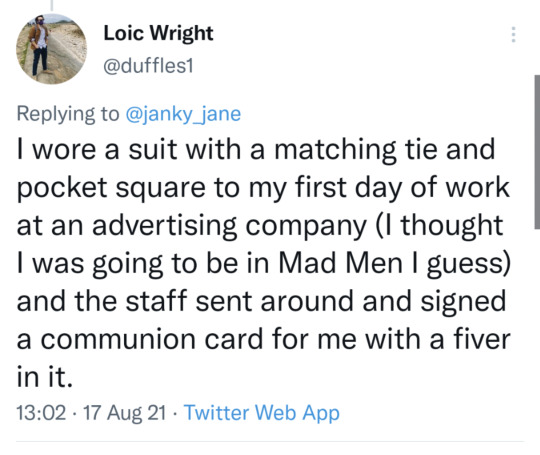
his wand is made of dogwood - which suits the flamboyant and loud.
he's shown in canon to quite like a bit of gossip - him being gassed up by quirrell's claim that he fought a zombie and then gutted when quirrell refuses to actually tell the story always sends me - and i like the idea of him being amazing value in a pub.
he's an only child - but he has at least thirty cousins. and his cousin fergus genuinely never did have another peaceful moment after seamus learned to apparate.
he and lavender went to the yule ball together because both dean and parvati are stupid and didn't see what was right in front of their faces. they split a bottle of archers behind a rose bush and complained about men and it was the best night of their lives.
he goes as red as a lobster the second the sun's out.
he runs the shit london guinness twitter account.
his boggart is a banshee because his dad - who is literally only mentioned once in philosopher's stone - dies over the summer before his second year [banshees - in irish folklore - herald the deaths of family members with their weeping]. however - unlike harry - you don't hear him fucking banging on about this all the time...
and he can't speak a word of irish, but none of the posh english lads he knows are going to risk calling him out on that...
#asks answered#asenora meta#seamus finnigan#northern ireland posting#republic of ireland posting#the fact that she didn't think *once* about the fact the ministry of magic is technically established by king billy...#joanne come on noyyyyy#dumbledore was in the apprentice boys i fear#that's why fawkes is orange#literally just checked the lexicon to see if anything significant happened on the twelfth...
88 notes
·
View notes
Note
do you have thoughts on ariana dumbledore?
Like about her character or about her situation?
Because we don't really know Ariana as a person at all. So, I can't really analyze her. I can have thoughts about her situation and what was going on with her magic.
I should note I don't consider anything about Obscurials from the Fantastic Beasts canon. I think it's a retcon and I don't like it. I mean, you’re telling me Obscurials are created when wizards bottle up their magic and then say Harry "cupboard under the stairs" Potter didn't become one? I don't buy it.
So, let's take a look at the tragedy that is Ariana Dumbledore's existence:
So, the information about Ariana is quite scarce when looking just at the books. And most sources are unreliable. Rita Skeeter lies more often than not. Elphias Doge thinks the sun shines out of Albus Dumbledore's ass. Aunt Muriel just wants mean gossip. Then there are the brothers, Albus and Aboforth, Albus with their own biases and agendas, leaving Abeforth as the best source about Ariana (even if he has his own biases).
But, limited information is when theorizing is the most fun.
I don't think she was an Obscurial
As I mentioned above I don't believe Obscurials are a thing in the Wizarding World of the books. The main reason I mentioned above is Harry. We know Harry, Tom, Snape, and Merope were all mistreated heavily as children and none of them become an Obscurial. Harry says so himself:
Numbly Harry thought of how the Dursleys had once shut him up, locked him away, kept him out of sight, all for the crime of being a wizard. Had Dumbledore’s sister suffered the same fate in reverse: imprisoned for her lack of magic? Had Dumbledore truly left her to her fate while he went off to Hogwarts to prove himself brilliant and talented?
(DH, page 137)
Harry was raised to not use his magic. To bottle it up and not use it, and yet, neither he nor any other wizard with similar circumstances became an Obscurial. It's weird that Obscurials could exist and we never heard of such creatures in the books themselves. If they did exist, I would assume muggleborns and muggle-raised wizards would be watched more closely for how dangerous they could be. Personally, I don't think Obscurials exist at all. It doesn't make sense within the universe we know.
So what was going on with Ariana?
“When my sister was six years old, she was attacked, by three Muggle boys. They’d seen her doing magic, spying through the back garden hedge: She was a kid, she couldn’t control it, no witch or wizard can at that age. What they saw, scared them, I expect. They forced their way through the hedge, and when she couldn’t show them the trick, they got a bit carried away trying to stop the little freak doing it.”
....
“It destroyed her, what they did: She was never right again. She wouldn’t use magic, but she couldn’t get rid of it; it turned inward and drove her mad, it exploded out of her when she couldn’t control it, and at times she was strange and dangerous. But mostly she was sweet and scared and harmless.
(DH, page 479)
These are two quotes from Aboforth about what happened to Ariana and how her magic responded. That same magic that eventually killed their mother, Kendra.
Now, we don't really know what these muggle boys did. It could have been sexual assault, even if Ariana was only 6 (as gross and horrifying as it is), it could've been they beat her up badly, we don't know. Whatever it was, it was incredibly traumatic to both her body and mind.
I wrote about how magic is very connected to a wizard's or witch's intentions and emotions and I believe that is the key to understanding what happened with Ariana. We also know, that when a witch or wizard is hurt, their magic will attempt to heal them. We also know from Harry and Neville that a child's magic will try to keep them out of harm's way when they can't control it yet:
Great Uncle Algie came round for dinner, and he was hanging me out of an upstairs window by the ankles when my Great Auntie Enid offered him a meringue and he accidentally let go. But I bounced — all the way down the garden and into the road.
(PS, page 91)
Dudley’s gang had been chasing him as usual when, as much to Harry’s surprise as anyone else’s, there he was sitting on the chimney.
(PS, page 21)
So, I wondered, what would happen if a magical child got so traumatized they were stuck in a fight or flight state? What if they feel under threat constantly? Well, I'd expect their magic to act up, as it always does when a young witch or wizard is under threat.
Basically, what I think is going on with Ariana's magic is kind of like a muggle allergy. Her magic (white blood cells, essentially) that wants to protect her and heal her, registers everything and everyone, even Ariana herself, as a threat it needs to fight. So it lashes out unpredictably like any child's accidental magic when under threat.
And the descriptions from Aboforth really sound like a child's accidental magic trying to keep the child safe by going highwire. I think she actually was sickly. I can't imagine her magic left her completely unharmed. It was also likely exhausting to constantly have her magic stretched thin trying to protect her from a threat that wasn't really there.
And we know this instability of her magic is why she was never let out of her mother's sight:
“—to permit her to leave the house?” cackled Muriel. “And yet she was never taken to St. Mungo’s and no Healer was ever summoned to see her!” “Really, Muriel, how can you possibly know whether—“ “For your information, Elphias, my cousin Lancelot was a Healer at St. Mungo’s at the time, and he told my family in strictest confidence that Ariana had never been seen there. All most suspicious, Lancelot thought!”
(DH, page 137)
because the Ministry had known what Ariana had become, she’d have been locked up in St. Mungo’s for good. They’d have seen her as a serious threat to the International Statute of Secrecy, unbalanced like she was, with magic exploding out of her at moments when she couldn’t keep it in any longer.
(DH, page 479)
They hid her from everyone. From Bathilda, any other neighbors, and from St. Mongos. And they were right to be concerned about what the ministry would do if they knew about Ariana. She was a danger to herself and the people around her, not because she meant to be. Because she was a young, traumatized witch whose magic kept trying to protect her when the threat was long gone.
#harry potter#hp#harry potter theory#hp theory#hollowedtheory#harry potter meta#hp meta#dumbledore#ariana dumbledore#asks#anon asks#anonymous
50 notes
·
View notes
Text
Harry Potter and the Case of Scotland, An Essay
Or; Scotland is independant, Hogwarts is a completely fucked up and the witches are dying by the dozen. 2700+ words.
Anyone who knows an inkling of British politics or history understands the tension between Scotland and England, an underlying issue that dates back to at least the Roman Conquest. Scotland is more progressive than England, with a strong focus on transgender issues, much to JKs fury. More than that, every council in Scotland saw "remain" majorities with Brexit, as compared to England and Wales. An independent Scotland is not far from the realms of possibility, although in Harry Potter, it seems Scotland has always been independent.
It's odd to imagine this. From what we've come to understand of the Wizarding World, magical boundaries and borders follow muggle ones. We see references to individual countries, including Bulgaria, France, and of course Albania. Ireland also features prominently, although it's not clear how seperate the country is — the Troubles is certainly a prominent part of Harry Potter, inspiring Voldemort's actions and also characterising Seamus, the only prominent canonical Irish character as a pyromaniac. Yet, conversely the clues about Scotland and the truth are hard to find.
When looking at Fantastic Beasts — the fake, graffitied textbook, not the movie — I found something odd. Scotland seems to be a seperate entity from the rest of the Ministry of Magic, or at least what counts as a 'country' within the sense of the Wizarding World. It's not explicit by any means, rather it's more implicit, but it piqued my interest and inspired this essay.
The International Confederation of Wizards has had to fine certain nations repeatedly for contravening Clause 73. Tibet and Scotland are two of the most persistent offenders. (Fantastic Beasts and Where to Find Them, 2001. pg. xvii.)
I highlight here "nation" and "Scotland".
Note: I'm ignoring Tibet as the book is meta and supposedly written in the 1920s-30s by Newt Scamander. Tibet existed as a country during this time.
Scotland is not a nation. It has not really been a nation since 1603 when James the VI of Scotland became James the I of England, although this wasn't really premeditated. Also, the two crowns, although united in the Stuart family, weren't really the same country. At least not in the way we understand it today. It wasn't until 1707 when Scotland and England were legally unified beyond just sharing a king.
The Statue of Secrecy, however, was signed in 1689, during this odd time where Scotland was joined by crowns but not by law. I wonder then, how possible it would be for Scottish wizards to have expressed the same disdain for the English and refused to join with England.
As I will discuss later, it makes sense with Scotland's population and history. Additionally, we know that schools in the Wizarding World transcend our own borders — Beuaxbaton seems to take French, Swiss, Belgium students, and I imagine (based on the bad world building) would take most of Western Europe. Similarly, Durmstrung takes students from most of Eastern Europe. This does make sense in some ways — WWI and WWII dramatically altered the borders of Europe. Scotland could easily take students from the rest of Britain, even if it itself is not a nation within the UK and is its own seperate entity.
Further, time and time again, we see that the Ministry has little no influence over what actually occurs within Hogwarts, with the exception of Umbridge. There is no set curriculum by teachers — each teacher is very different and teaches what they want, which we see both with Hagrid and the multitude of DADA professors. This makes little sense; within a state school, or a school that has government involvement, you would expect some centralisation of what should be taught in schools. Even private schools have some sort of organisation along this basis, though I will be discussing more of this later.
Additionally, the Ministry have no role in appointing people for jobs or firing people within Hogwarts — Dumbledore is not removed from power until after he has broken a law against the ministry, which makes him appear to be the result of long-armed jurisdiction. Umbridge's power then, comes not just from the ministry, but from being an international agent, likely granted under something similar to an extradition treaty by the Scottish government.
Researching online showed nothing else, but I think from conjecture we can say that Scotland is independent, based too on its real life history (which is something I'll explore momentarily). This being the case, and its close proximity to England plus (largely) shared history, I imagine Scotland has a system similar to the rest of the UK, if more feudal.
It's likely Scotland's government is an oligarchy, run by barons and old families. There is only one name within the Sacred 28 which has Scottish origins, which could suggest the Macmillan's had a monopoly over this, but also could be simply Cantankerous Nott's bias or the Macmillians being the only 'pure' family from Scotland to marry into Sacred 28.
We do know that the Ross's (McGonagall's maternal family) were pureblood and McGonagall's mother eloped with a muggle. I think they would've been a fairly important family in Scotland's oligarchy as Ross is an area of Scotland. Following this logic, there should be other old families which take their name from the land (or vice verse) — Fife, Moray, Kinross, Selkirk, etc. — though none of these are characters last names canonically.
The Buchanan's are also a Pureblood family, and quite Purist. They're mentioned on Pottermore and one of the sons, Angus Buchanan was a squib who, after being kicked out, became a Scottish rugby player, inspired by the real Angus Buchanan and wrote a book about being a squib. Apparently he's the reason every wizard canonically supports the Scottish rugby team.
Finally, I'll suggest the Dale family as Pureblood and potentially part of this oligarchy. They're from Hogwarts Legacy and one of their members cursed the family tomb (located near Hogwarts) around 1300, but their family continues until the late 19th century at least. A family that has the money to build a tomb, the means to curse it and the ability/need to maintain their family name for so long is likely Pureblood.
There are other Scottish families, or ones that could be attributed to Scotland, but these had the strongest bases within known material and fell into at least three of the following categories.
Pureblood
Old families/family names
Monetary means
Obsessed with blood purity
More than a paragraph about them on the Harry Potter Wiki
Of course none of this is definite and delves into the realm of headcanons and OCs, but I'd recommend these as a starting point if someone were to ever write something based on this. I'd also recommend looking at Macbeth for character names.
The Tragedie of Macbeth was written in 1606 for King James I and VI of England and Scotland. It's one of Shakespeare's most famous plays (and my favourite), and is so ingrained within Western culture today — rules about not saying its name in the theatre, a self-fulfilled prophecy, double double toil and trouble, and of course the three witches — and these things all inspire the Wizarding World too, with the last three manifesting throughout the books and movies.
James was obsessed with witches — that's why Shakespeare wrote Macbeth for him (and also as a way to comment about the tyranny James was imposing on England; good stories are cultural critiques as well as being entertaining). In 1597, King James had written Daemonologie, a philosophical dissertation on witches, necromancy, black magic and demons. He advocated strongly for witch trials. Of course, Malleus Maleficarum, written in Germany, 1486, had also advocated for the same things.
Scotland is heavily associated with witchcraft — buidseachd in the original Scots Gaelic — for these things. It was also a place of comparatively high witch trials in comparison to England, with an estimated 4000-6000 people tried and more than 1500 executed (roughly 75% of them were women). These numbers were also 4 times the European average. While the more reported trials occurred during the period between the crowns inheritance and legal unification of Scotland and England, they were established widely before this too. Additionally, there was a entire entity of the Scottish Kirk which set up kirk sessions (elected officials of churches in charge of determining whether a person was guilty) as early as 1560 in some places, with legal introductions in 1597 — England did not have these sorts of things.
With the intense conditions of the period, it is likely wixen in Scotland were driven into hiding before their English counterparts, thus allowing for the distancing between the muggle and the wizarding world perhaps even before the two crowns united in 1603, as discussed in the previous section. This being the case, I would determine that Scotland, as a result of the rising tensions between the witchcraft and the muggle world enforced their own statue of secrecy and divided from the government between 1597 and 1603.
However, I think the majority of these issues stem too from the establishment of Hogwarts and the problems it faces in regards to world building. Canonically Hogwarts does exist with Scotland, which makes perfect sense when it comes to isolation, but the model is historically flawed in more ways than one.
According to Pottermore, Hogwarts was founded "at some point in the tenth century… concealed with numerous charms and spells to make it impossible for Muggles to trespass," the most notable being "any passing Muggle would only see ruins." Historically, this is impossible.
Castles as we understand them were only just beginning to make their appearances in mainland Europe in the late 10th century. Previously, they had been wooden structures, but even these 10th century stone structures are nowhere near the fairytale castles that pop-culture depicts. They were motte-and-bailey designs that were continued in some places until the 13th century, and were more concerned with fortification and intimidation than beauty. They looked a lot like this:

The motte was a huge pile of earth, incredibly steep and offered protection as guardhouses were built on top. The bailey was where people lived, worked and stored food. They were surrounded, often by high wooden posts and earthworks, whose ditches could sometimes act as moats when it flooded, although were just as difficult to invade when dry. They were easy to defend as they only had one entrance and most of the buildings inside would've been wooden, though stone buildings on the motte were not uncommon. There are many surviving examples and ruins around France and England. Herein lies several problems.
Firstly, these motte-and-bailey's originated in France during the early medieval period and were introduced to England following the Norman invasion in 1066. Any construction of these buildings in England would've been limited to the 11th and 12th centuries largely, as prior to the Norman invasion, the Anglo-Saxons followed more German and Norse traditions of large thatched halls.
You may have noted that I fail to mention Scotland in this discussion of early castles. This is because castles were nonexistent in Scotland until King David I brought them back from England and adopted them and feudalism in the 12th century. The earliest known castle in Scotland is Castle Sween built in 1100, about two centuries after Hogwarts was supposedly built. Only the ruins and earthworks remain, and it's believed the towers were later additions.

What might be noticeable is how little it looks like Hogwarts. Early medieval castles — in actuality most medieval castles — were stone walls which housed interior wooden buildings which have since been destroyed by any number of things. They were not the fairytale structures that come to mind in association with the word "castle". Those were a later constructions of the Georgian and Victorian periods from the 18th century onwards. Instead of being fortresses like medieval castles, they were homes of luxury.
Put simply, Hogwarts does not make historical sense in its construction or portrayal. Unless it was adapted and improved upon as time went on (which is unlikely and infeasible) Hogwarts should be nothing more than rotted huts. There's more to say on the poor grasp of history (I could go on about Merlin or the founders), but Hogwarts continues to bother me in the modern world too.
We return again to government and our question of whether Hogwarts is a government school or a private one. Although the wizarding world is deeply capitalist, with the common assumption being that students pay a yearly fee to attend within fics, I doubt this. There is never any mention of this within the books, and logistically it doesn't make sense. How do muggleborns pay? How do wizarding families like the Weasley's pay? If there had been some kind of transaction, we would've seen it in the books given they're told from Harry's experience. Alternatively, acting on the assumption that Scotland is it's own nation within the wizarding world brings up similar issues regarding the standardisation of schooling as I discussed earlier — there is little to none. For these reasons, I don't think Hogwarts is a government school either.
Returning once more to history, I think Hogwarts takes its education system from the charity schools which populated the UK for a large portion of its history until national-run schools opened in the 19th century. Their goal was to provide some education to the small towns where they were established but there was no standardisation of them across the UK. With the historical context in regards to the split from the muggle world in the 16th/17th century and the stagnation of wizarding government since then, it makes perfect sense for Hogwarts to act as a charity school, especially as according to Pottermore it was originally constructed to hide wizards who were "being persecuted by muggles."
This also makes sense if we take into account O.W.Ls and N.E.W.Ts, which act as standardised tests for an unstandardised system. I think these were developed sometime in the 20th century to act as a qualification, particularly as the muggle world was becoming more bureaucratic and the wizarding one was failing to match up. It's likely it was an effort by the ICW rather than an individual nation, although other countries call them different things.
O.W.Ls and N.E.W.Ts in themselves suggest other schools similar to Hogwarts or homeschooling. This isn't completely out of line with what appears in canon either. Although the Gaunts are largely squibs by the mid-20th century, they still do possess some magic. For all his faults Marvolo would have taught both Merope and Morfin. Using this, we can ascertain that school-aged students are not required to go to Hogwarts. We can also deduce this from the fact that the trace is added onto wands after the first year at Hogwarts, as Hermione mentions all the spells have worked for her when trying them at home before Hogwarts. As such, it's a safety measure implemented by Hogwarts, fulfilling its original purpose as a place of protection, acting as a charity school for those who have no other options or for those who simply want to attend.
Hogwarts as a charity school acts simply. It is funded by a board, ideally a board that is not elected but instead based off inheritance and nepotism, with families like the Malfoys having funded it for generations (which would explain Lucius' attendance of school quidditch games). While examiners do enter Hogwarts for O.W.Ls and N.E.W.Ts, this is only done as it's the biggest school in the region. Students at Hogwarts, at other wizarding schools, or through home-schooling and their parents education can also complete self-study (including of subjects not offered at Hogwarts) and complete their O.W.Ls or N.E.W.Ts at any ICW approved governing body, which includes Scotland's ministry, however that might manifest.
I don't think I can offer any conclusion to this, and for now my ideas are exhausted. I think I'm more poking at holes with a stick and making them bigger, but I wanted some way to record everything and work through issues and interesting things. Much of this developed and grew as I was writing — this began as only a discussion of whether Scotland was a nation within HP. If I've forgotten anything or piqued any interests my asks are open.
#hp meta#hp historical context#harry potter meta#harry potter theory#harry potter plot holes#harry potter headcannons#harry potter#harry potter fandom#hogwarts#hogwarts school of witchcraft and wizardry#wizarding world#wizarding society#essay#of sorts#the fact that this is over 2700 words#i should be studying for history and english exams i actually need
18 notes
·
View notes
Text
Book Review 57 – Pale by Wildbow

I have been reading Pale as it released from the very beginning in 2020 until the end. As such I am clearly suffering from a severe and acute case of Stockholm Syndrome, and you shouldn’t trust a single thing I say. But to try and step back a bit – Pale is the best 4 million word serial I have ever read, and very nearly even good.
The story follows Avery, Lucy and Verona, precocious and for various reasons marginalized teenagers in a decaying Canadian ski town. They are recruited by a council of the various ghouls, ghosts and goblins who live in the shadows of the town to be its Official Witches and investigate the mysterious death of the Carmine Beast, the greater spirit who stood as judge over all contests of struggle and violence in the region (less in the hopes that find anything and more so that any nosy outsiders can be truthfully told it has already been handled). Being of a protagonist-ey bent, they rapidly exceed their new patrons’ expectations, especially the ones among them who had a hand in the murder. After that it’s basically just literally several million words of things escalating further and further out of anyone’s control.
Or, I kid, but it really is impossible to talk about Pale without forgrounding its length and medium, I think. This is a serial which ran continuously with at least one update a week for more than three years, and (to grab another story about child wizards to compare) is roughly four complete Harry Potter series’ in length. Beyond being an entirely superhuman accomplishment as far as writing productivity goes, this had unavoidable effects on the story as it was being told. It also makes it literally impossible to provide anything like a complete plot summary in a review short enough that anyone will read it. So just take my word that there’s a lot of it, and we’ll come back to the others length-related issues.
This is an urban fantasy book, and a kitchen sink one at that – it’s clearly one of the underlying principles of the setting that it should, insofar as possible, be able to fit every type of storybook monster and horror movie plot and twilight zone episode within it somewhere. Underlying and ordering it all is the axiom that (almost) nothing magical can lie. The world will only respond to your word if its actually worth something – contradicting or gainsaying yourself harms your karma and sets the universe against you, breaking a sworn oath is an open invitation to fates worse than death. The natural consequence of this is that every practitioner (wizard, basically) worth shit has been trained from birth to be an asshole genie and most of the really powerful Others (catch-all term for supernatural creatures) come by it naturally.
None of which is new – this is the second serial Wildbow has written in the setting – but they do combine to make a bunch of amateur detectives investigating a murder really, really fun. The heroines POVs also offers a great way to introduce the setting to the reader, or, at least, provides an excellent justification for in character exposition dumps – and to be clear, this is a series with lore. I consider this an absolute win, but if you don’t like elaborate asides about random monsters or marginal otherworlds that clearly exist only because the author thought they were cool, then this is not the series for you. (On the other hand, most of them are absolutely cool). The world is vast, and the story is full of asides and tangents about things that could easily sustain a novel in their own right.
The other way the exposition is provided is through occasional Extra Materials mini-chapters (quite regular during the beginning of the story, less so as it goes on), which are just excerpts of in-universe documentation – specifically things that the protagonists or occasionally another major character would have been reading. Everything from class notes to chatlogs to investigation summaries as written by one of the girls to local social media posts to a dozen other things. Surprisingly good graphic design on most of them too, which really helps sell them as in-universe artifacts and as ways to characterize the implied authors/readers. It’s very much to the serial’s detriment that these fade away as it goes on.
The series has three protagonists, and chapters alternate between each of their POVs and internal narration. It actually does an excellent job differentiating between Lucy, Avery and Verona and giving them their own distinct voices and making each compelling in their own right (not that I don’t have my favourite, but). While the book’s not perfect about it, on the whole they mostly feel like unusually bright and dedicated teenagers (and increasingly incredibly traumatized child soldiers with variably healthy coping mechanisms), rather than short and legally disabled adults.
As is fairly common with web serials, the normal chapters are intercut with interludes from the perspective of some more minor character. Across all Wildbow’s works, these are honestly where he really shines most, I think. They’re each essentially short stories introducing and providing the history and characterization of someone from their own point of view, in the process more often than not totally recontextualizing their role in the story so far, with how they advance the actual plot almost incidental half the time. If I wanted to sell someone on the setting with as little investment as possible, I would probably just link them the first interlude – the first 90% of the chapter is a really quite good standalone horror story about a totally normal kinda shitty kid getting drawn into and being consumed by an occult living ritual (with its own creepy song! And cannibalism!)
Wildbow is actually an incredibly gifted character writer - both as a web serial author (but on the whole that’s not really any great accomplishment) and just, generally. Despite having an absolutely comically sprawling cast (like, dozens, minimum. If you told me hundreds I’d believe you), he manages to give the vast, vast majority of ones that matter their own distinct aesthetics, voices, and even their own little character arcs and plotlines. Even as much as I complain about bloat and pacing, it never stops being a joy to just spend time in any of the three protagonists’ heads, and I was deeply invested in them achieving their dreams in a way I rarely if ever am for fictional characters.
Now, the complaining. Wildbow is, as I said, one of the best character writers I know working today. The same cannot be said for his skill writing action scenes – which is incredibly unfortunate, because there are so, so fucking many of them. Some serve a real narrative purpose or showcase some bit of characterization, but most could honestly be cut by 90% and you wouldn’t lose anything except wordcount – even the ones which should be there tend to drag on past their natural end because of the book’s love of making things as desperate and hardwon as possible. Which I wouldn’t necessarily mind but like, there are individual action set-pieces that are longer than some published novels. At a certain point exhaustion sets in. If I had to guess, I’d put this down to the fact that when you’re writing 10k words a week and don’t have any concrete ideas of where to go next with the plot worked out, just extending the action scene and throwing some new monsters or puzzles or reversals of fortune at the heroes can eat up a chapter and buy you some time – but just because it’s an understandable consequence of the serial format doesn’t mean I need to like it.
Perhaps reading far too much into it, but if I had to guess, I would say the story’s more structural issues stem from the same thing. Pale was originally planned as a (relatively) short and (relatively) light serial, but in the process of writing rapidly ballooned past all planning and expectation. Which like, as I said, I just enjoyed spending time in the various protagonists’ heads and seeing them develop, but at a certain point you can absolutely start to see the plot starting to outpace all planning and spinning off in multiple entirely new directions that were pretty clearly informed by whatever idea Wildbow was turning over in his head at the time. Sometimes this worked out very nicely – I still love Avery’s whole Thunder Bay/accidental love triangle arc. Sometimes it’s a bit mixed – Wonderkand is a very fun idea, but tonally and aesthetically is kind of a mismatch with 90% of the rest of the setting. Sometimes, well – did anyone like the extended Aurum/Dark Fall trial sequence? But even aside from individual arc quality, if you are someone who cares even slightly about things like ‘pacing’, ‘narrative discipline’, or ‘plot points/foreshadowing not going in weird directions or fading in the background because the author just forgot/kind of lost interest in them in the course or writing a novella weekly for three years’ then oh boy is this not the story for you.
A similar sort of thing happens, I think, with the story’s themes. Pale is from the beginning very explicitly concerned with ideas of punitive versus rehabilitative justice, an already slightly fraught use of the subjugation/binding of magical creatures as a metaphor for oppression and colonization, and just generally with the idea of building a better world in the hidden corners of the current one. The story, well, remains very interested with those subjects, but having any coherent viewpoint on them falls to the wayside compared to coming up with ways to advance the plot or dilemmas to throw at the protagonists or just vivid bits of imagery in the moment. This more or less generalizes – I kind of get the sense that Wildbow set out wanting to write something that goes against his narrative reflexes/habits, but as the story went on and the writing piled up they just kind of crept back in. Certainly for a story that take pains at first to emphasize how hellish and cruel long term binding and confinement are, the happy ending involves a lot of various cruel and torturous prisons that are portrayed as somewhere between necessary and just. The big final villain also more or less works on a character level, but thematically is basically the single worst choice of anyone the protagonists faced down across the entire story.
I’m accentuating the negative here, and part of that is just because I’m a miserable husk of a human, but it’s also just that Pale’s real problems tend to be structural, while its high points are much more particular and specific, and hard to sell without immense amounts of context – there are so many random side characters who get more compelling stories than the actual protagonists of some books I’ve read this year, and a half dozen scenes that are pretty permanently burned into my memory. My favourite dynamic involves a character whose only present for, like, 3% of the story max.
At one point the story was intended to end with Arc 13, followed by a hiatus and then a sequel. I still think this would have been the correct choice, even that ending would rip my fucking heart out and also possibly get Wildbow literal bombs mailed to his house. Still – if you can stand that sort of ending and also are the sort of person to read million-word web serials to begin with, that would be my recommendation. Get to that point, and then decide for yourself how invested you are in spending time in the heads of the protagonists and in the world. Or read Pact, which is like a fifth of the size and ostensibly set in the same setting – though leans so much further into horror than urban fantasy for tone that functionally there’s a lot of discrepancies.
All of which said, Verona Lucy and Avery are going to live in my head for the rest of my life and I make no apologies about this.
93 notes
·
View notes
Text
Fic Titles W/ Character Names (3) Masterlist
part one, part two
A Seamus Thing (ao3) - Delphi seamus/dean E, 3k
Summary: Dean and Seamus share a tent at the Quidditch World Cup during Harry Potter and the Goblet of Fire.
Be Mine, Hermione. (ao3) - monsterleadmehome hermione/draco E, 3k
Summary: It’s Valentine’s Day and Hermione has been receiving mysterious paper hearts from a secret admirer for a week. She has no clue who the culprit could be, but he seems to know her better than almost anyone. He ends each note with “Be mine, Hermione.”
Cedric’s Necklace (ao3) - shadowglove88 cedric/blaise T, 8k
Summary: The first time Blaise met Cedric Diggory he’d been freshly sorted into Slytherin and not exactly as proud or smug as Malfoy about it. He never guessed that the chance meeting would evolve into something that’d change his life forever.
Draco Malfoy and the Mortifying Ordeal of Being in Love (ao3) - isthisselfcare hermione/draco E, 199k
Summary: Hermione straddles the Muggle and Magical worlds as a medical researcher and Healer about to make a big discovery. Draco is an Auror assigned to protect her from forces unknown – to both of their displeasure.
Features hyper-competent, fiery Hermione and lazy, yet dangerous, Draco. Slow burn.
Hagrid Saves the Day (ao3) - Roff T, 5k
Summary: Rubeus Hagrid, keeper of keys and grounds at Hogwarts, thinks of a good way he can help when Voldemort and his death eaters come calling.
Harry Hagrid (ao3) - Zerox_Z21 G, 111k
Summary: Instead of being abandoned at the Dursleys’ doorstep, Harry is instead adopted by family friend Hagrid. Shameless fluff fic.
Herbology_Neville and DragonKeeperCW (ao3) - Anaxandria neville/charlie E, 11k
Summary: When Neville starts live-streaming on WixenVid, he’s unsure who would want to watch him ramble about plants for an hour.
Hermione Granger, Demonologist (fanfiction.net) - BrilliantLady
Summary: Hermione was eight when she summoned her first demon. She was lonely. He asked what she wanted, and she said a friend to have tea parties with. It confused him a lot. But that wasn’t going to stop him from striking a promising deal with the young witch. Dark!Hermione, Slytherin!Hermione, occult theme. Complete.
Lee Jordan’s Untold Love Story (ao3) - scarlettjabner lee/fred N/R, 3k
Summary: The title says it all.
Lessons With Hagrid (fanfiction.net) - NothingPretentious T, 4k
Summary: “Have you found out how to get past that beast of Hagrid’s yet?” …Snape kicks Harry out of ‘Remedial Potions’, but as we know from The Philosopher’s Stone, there is another Occlumens in the school good enough to keep out the Dark Lord. Stupid oneshot.
Lily Evans and the Head Boy (ao3) - roaraf james/lily T, 79k
Summary: Lily Evans’s final year at Hogwarts gets off to a bit of a rough start. Between NEWTs, her Head Girl duties, her ruined friendship with Severus Snape, and the obnoxiously dreadful Head Boy James Potter, she has little time to think about the looming threat of He Who Must Not Be Named and the evils that lurk outside the walls of the castle.
As the challenges that face the Wizarding World become more of a part of Lily’s life, she comes face-to-face with a side of James she’s never seen before and an unlikely partnership develops between them. Confronted with dangers beyond their years, Lily, James and their friends grow together into the courageous witches and wizards of the Order of the Phoenix.
Starts just before Lily and James’s 7th year and ends shortly after they leave Hogwarts.
Lily Evans and the Marauders (ao3) - FeBee G, 54k
Summary: Twenty years before Harry Potter received his letter inviting him to Hogwarts, his parents began their own journey and it all started with a rose.
Looking After Hermione (ao3) - amidland hermione/harry T, 9k
Summary: As a break from the stresses of moving house, Harry treats his girlfriend, Hermione, to a day full of dates for Valentine’s Day. Only, when do Harry’s plans always work out perfectly?
Loving Neville (ao3) - MarshmallowMcGonagall neville/draco/harry M, 797
Summary: Harry and Draco love Neville, but sometimes the Herbology Professor can get a bit carried away.
Luna Lovegood and the Dark Lord’s Diary (fanfiction.net) - The madness in me G, 72k
Summary: Tom Riddle’s plans fall through when Ginny Weasley loses his diary shortly after starting her first year and it is found by one Luna Lovegood. A series of bizarre conversations follow. Luna? - Yes Tom? - I’ve been giving this a lot of thought…and I believe you may be insane. (Not crack. Plot takes a while to appear but it’s there) See last chapter for fan art and translations.
Petunia (ao3) - antebunny T, 1k
Summary: In which Lily finds a way to teach her sister magic.
Ronald (ao3) - DistrictThirteenTribute hermione/ron, harry/ginny G, 580
Summary: Ron secretly loves it when Hermione calls him by his full name. And one day, in the middle of an argument, he’s finally going to let her know it.
sirius & the gryffindor common room sitting in a tree K-I-S-S-I-N-G (ao3) - halfshook sirius/remus T, 1k
Summary: The kiss was short and sweet and Remus had smiled into it but it was nothing more than a simple farewell between lovers.
But that was the problem. No one knew they were lovers.
or the one where sirius kisses EVERYONE to cover up his relationship with Remus
The Problem with Dating a Professor Named Neville (ao3) - coffee_n_cocoa [archived by thequidditchpitch_archivist] E, 4k
Summary: Twelve-year-old James is horrified to discover his mother’s boyfriend and his Herbology professor at Hogwarts are the same person.
The Three Trials Of Severus Snape (ao3) - copperbadge T, 5k
Summary: Minerva McGonagall narrates three events in the life of Severus Snape, in an attempt to show his true character.
#wizardingworldlibrary#harry potter fanfiction#harry potter fanfic#names#names masterlist#minerva mcgonagall#neville longbottom#sirius black#remus lupin#seamus finnigan#dean thomas#hermione granger#draco malfoy#cedric diggory#blaise zabini#harry potter#hagrid#charlie weasley#fred weasley#lee jordan#james potter#lily evans#petunia dursley#ron weasley#severus snape
8 notes
·
View notes
Text
UDLTTOM WORLDBUILDING RAMBLES: American Wizarding Society vs British Wizarding Society
This is like the 3rd installment of what is quickly becoming a series of long ranting posts about the lore surrounding Harry Potter & a current time-travel au I'm writing on AO3. But you don't need to have read the previous two posts to understand this one. (I still link them for those interested: pt 1, pt 2, pt. 3.) .
I think it's been fairly established that JK doesn't have much awareness of anything outside of Britain when it comes to world building. I've seen posts discussing how unrealistic the magical schools are and such. (Which obviously there can't be just 11 schools. I refuse to believe it. It exceeds my suspension of disbelief.) But this post isn't about that, but the whole societal structure of the American Wizarding society as a whole. I recently started watching my through the Fantastic Beasts films (I know I'm late to the show.) and as an American I can't help but to address some of this...
There's a lot to address & I'm sorry if this post gets a off on some tangents. But I'm just gonna jump right in with the things that bother me most.
1)The MACUSA reeks of British colonization.
As we all know, North America wasn't unpopulated when people from Europe started arriving. Native Americans, the Mayans, the Aztecs, Inuit people, and while some of them were nomadic others had established cities & advanced communities for that day in age. It was the religious zealot Protestants, aka Puritians, being driven out of England that pushed into these communities and brought with them this harmful religious dogma and pushed these people out of the homes and their lands. Like if you read into any of these cultures and their histories, you'll see that these communities were accepting of magic and in the HP world were probably very much wizards themselves.
And so the MACUSA doesn't make sense to me having been founded before the American Revolution, but after the Salem Witch Trials because in all likelihood wizards were being persecuted long before all that. Like I can't believe that the indigenous communities wouldn't have formed some sort of collective in order to combat these foreign invaders from overseas—Especially if they were wizards.
I mean so there had to be something before that, right? Like in all likelihood what I see happening is that these British wizards pushed themselves in with the Puritians (for whatever reason) and in the process brought with them their backwards views on muggles & blood politics & classism which wasn't a part of the original society. Because if you look at the indigenous histories you'll see that medicine men/women were respected members of their communities. Wizards and Muggles lived alongside each other just fine. But then the colonizers came & ruined that harmonious dynamic between the magical and nonmagical.
And that it's called the Magical Congress of the United States of America...It doesn't make sense unless that name came about after the American Revolution. Because before that it was referred to as the 13 colonies. Then it also took some time after the American Revolution for the 13 colonies to expand into the United States. (American didn't get all 50 states until 1959 with the purchase of Alaska from Russia and the forceful occupation of Hawaii.)
It makes more sense that there was a power struggle between two or more opposing Magical governments for the control of the Americas. And this would lead to a sort of Wizarding Civil War. Between the indigenous magical communities and the British, & Spanish, & French Colonies. It's a big place, huge. & it would be diced up and divided I think much more than than the muggle/no-maj community/government is.
The MACUSA being only on the East Coast makes more sense to me. (It also explains how there can only be one wizarding school in MA.) And how that school is a sister school of Hogwarts & how they are structured so similarly. Because watching the Fantastic Beasts films I don't feel like I'm watching American wizards, it more feels like I'm watching British Wizards with American accents.
And then the rest of the country is split up into districts or regions (much like it is in real life with: East Coast, Deep South, West Coast, Midwest.) where the indigenous practices and cultures are still prevalent.
I also don't buy into this idea that France and Spain would abandon their stake on the Continent. So in reality, it's more believable that Spanish Wizards would control Florida and expand all the way up to Arkansas, French wizards would Have control of Louisiana & Mississippi, East Texas, parts of Oklahoma, the British Wizards would have the colonies & maybe parts of the Great Lakes area like Illinois or Ohio, and then the rest of North America would be divided up into different territories amongst the indigenous communities.
Which then brings me to the second thing that bothers me: Rappaport's Law.
2) Rappaport's Law is a heavy-handed allegory for Jim Crowe & Segregation Laws.
As a white person, there's a lot in this topic that I am likely under informed and underqualified to unpack. It is a subject that would be better dissected by someone who understands the cultural histories and nuances better than me. But I read up a lot on random histories (because my Adhd brain leads me down some interesting research rabbit holes & I find myself fascinated by lore histories and folktales.) And I've learned a bit about the various histories pertaining to the Trans Atlantic Slave trade and how things like Voodoo made their way to America through the enslavement of various African tribes.
And again back to the British colonization, slaves were sold to the British by rival tribes & then some of those people made their way to North America when the colonies were formed , but that there was also a significant number of slaves that were indigenous to North America as well.
But how the indigenous communities were structured and how the tribal communities were structure were not all that dissimilar from each other. They both have an awareness of magic and similar spiritual practices. Again magic coexisting with muggles and what makes the most sense was that rival tribes would in fact sell the wizards into slavery and keep the squib/no-maj members of the village because they were less of a threat.
Which in turn would lead to most of the magical communities in North America being POC. Like honestly, I think they are the majority in the Americas. And the Rappaport Law, preventing the intermingling of no-majs & wizards would be heavily criticized because of the similarities to Jim Crowe and Segregation Laws.
And you might try to argue that because of the Statute of Secrecy, wizards wouldn't have any awareness of those muggle laws. But I argue that because of Slavery and most of the wizards being either slaves or negatively impacted by the European settlers would be very, very aware of those laws and prejudices & be actively fighting against them.
Like it was wizards creating and maintaining the underground railroad. It was wizards getting other wizards out and getting them away, regardless of whether or not they were magical because they were all slaves. And they would in fact still have muggles living side-by-side with them in these magical communities and spitting in the face of the Statute of Secrecy. And entire generations of no-majs would live and die in these communities and possibly even leave these communities to assimilate with other muggles and what not, but the American wizards would not be as cut off from the no-maj world like their British counterparts are.
3) Blood Politics would never be able to take root there.
Because most of them are unable to trace back their own bloodlines. It's why Americans don't have house elves working for them because it's Slavery, which they spent centuries combating and trying to escape. And why Grindelwald couldn't gain a foothold there because he was European and was actively killing muggleborns, squibs, no-majs like that wasn't their own people.
And this would also mean that, technologically, the magical communities in North America are more advanced. They are not stagnating like they are in Britain. Wizards are not a dying breed. They have a healthy growing population and low inbreeding rates, and advancements in magic and no-maj sciences. It's the sort of strength Grindelwald and Voldemort would want to recruit for their causes, but with how the majority of the continent is structured would never be able to.
[thank you for coming to my tedtalk.]
#hp fandom#harry potter#harry potter meta#udlttom#udlttom worldbuilding rambles#north america wizards vs british wizards#tomarry fic#time travel au#macusa#rambling thoughts on wizards in north america#non canon compliant#poc in harry potter verse
99 notes
·
View notes
Text
So I know the actual reason is “the author is an idiot who didn’t think through her worldbuilding beyond the surface level,” but there are a lot of little and big lore issues about Harry Potter that bother me to this day, such as:
Three-headed dogs exist in the world, but are not elaborated on in Fantastic Beasts. What’s their deal? Why aren’t they considered magical beasts?
What’s the deal with hags? Are they a separate species or just ugly witches?
Also vampires. How do they fit into the world? They never really appear and are mainly relegated to chocolate frog cards detailing that Dracula. Carmilla, and Varney were all canon (the latter also being Jack the Ripper).
Speaking of, Goliath is confirmed to have existed. How much of the Bible actually happened in-universe? Are angels and demons real? Was Jesus a wizard?
Why are so many historical events totally unchanged? Like there had to be wizards affected by the Crusades, the Inquisition, witch trials, the slave trade, and multiple genocides and ethnic cleansings. Why did they just allow all that to happen?
Along with the above, are wizards okay with elf enslavement because they were complicit in the slave trade? I can’t think of any other logical reason why wizards would otherwise be okay with enslaving sentient beings.
What’s with all the bizarrely strong one-shot artifacts like the Mirror of Erised and time turners? Even the Deathly Hallows. Could they not be replicated since they are apparently of human origin, and if so why aren’t there more floating around?
Why the hell is a dark wizard black market allowed to openly operate?
Why are former wizard Nazis allowed to teach children?
How the hell was Slytherin able to hide a complex underground base containing a massive and deadly snake from his fellow founders? Did he just build it while they were sleeping?
Literally what the fuck is the logic behind almost every wizard being completely ignorant of even the most simple technology? Like hardly any of them have electricity and Nr. Weasley is mystified by something as simple as a rubber duck. Why? Are they stupid?
48 notes
·
View notes
Text
Terrible Fic Idea #81: Harry Potter, but make it Aberforth's Daughter
Having been told that choosing to be a muggle in the Wizarding World is "not getting into the spirit of things", I set about determining under what circumstances I could bear to live in the British Wizarding World. This is what I came up with.
Or: What if the SI were to replace Aberforth Dumbledore's OC daughter?
aka the Aberforth's Daughter SI fic
Some context:
First, we're leaning heavily on book canon while dipping our toes into Hogwarts Legacy as far as the extended magical communities in the Scottish Highlands are concerned. This means no Fantastic Beasts movies, no Credence Barebone, but the Hogwarts Legacy map and the implication the Wizarding World is bigger than just a school and alley - and actually magical.
Secondly, the OC wakes up with memories of her past life as the SI on her fifth birthday. This is less of a true SI than a modern woman in the British Wizarding World, with the middle-aged SI being a critical HP fan with an engineering background.
Thirdly, the SI takes the place of an OC - Aberforth's daughter, Aishwarya Devi, born in early 1979 as a result of fling with an Anglo-Indian astrophysicist by the name of Sandhya Devi who moved to the UK as a young adult. Although Aishwarya - Ash - is never unaware of who her father is, her parents agreed before she was born that Sandhya raises Aishwarya by herself for a variety of reasons that are part wartime paranoia, part not wanting to burden a child with the expectations of the Dumbledore name, and part Aberforth really not being cut out to be a husband or father. Assume she existed in canon, was sent to school in her mother's native India, and never made it into the pages of the books.
Just imagine it:
Ash grows up in the town of Brocburrow in the Hogsmede Valley. She is a quiet but inquisitive child - two traits that only grow more pronounced after she remembers he past life as the SI.
It becomes painfully clear early on that there is nothing she can do to prevent the Second Wizarding War from her position as an untrained underage witch, so Ash concentrates on learning everything she can so as to survive it, soaking up everything her mother can teach her - Wizarding and muggle astronomy, plus more runes and arithmancy than most ever learn in Hogwarts - and reading everything she can about this new world she has unfortunately found herself a part of.
The more she learns, the less impressed with the British Wizarding World Ash becomes. Too much power is concentrated in the hands of too few, with most wizards willing to blindly follow the most magically powerful among them because of a lingering belief that the magically powerful are magically powerful because they are deserving of it. (Think of the similar medieval concept re: nobles and their presumed nobility.)
Aberforth has little role in her childhood. If Ash had really been a child, it would have been easy to mistake his distance for lack of care, but having once been a semi-functional adult it's easier to see that Aberforth simply has no idea how to interact with children. He tries for her sake and Ash can't help but love him for it, even as he fails miserably.
Although Sandhya initially wishes her daughter to attend her alma mater back in India, Ash manages to convince her to let her attend Hogwarts in the fall of 1990, one year before Harry Potter is set to start his schooling.
To no one's surprise, she ends up sorted into Ravenclaw - and wielding an acacia and huma feather wand. ("A kingmaker's wand," Ollivander says.)
First year it's her intention to keep her head down and avoid attracting the notice of her uncle. Ash succeeds in this, coming across as just another academically gifted Ravenclaw, albeit one who makes a bit of a name for herself complaining that the muggles know such much more about outer space than we do. And math. Calculus was invented before the Statute of Secrecy, you know.
She also manages to strike up a surprising friendship with fourth year Percy Weasley - their usual tables in the library are next to each other and so they form a quiet academic acquaintanceship that evolves almost without them realizing it into true friendship. As least half of this is based Percy once telling his brothers off for a prank that borders more on bullying than humor, and the rest on Ash being just that advanced in astronomy and arithmancy.
Second year Ash is determined to stay out of the sorcerer's stone debacle - but also sets out to cultivate a friendship with Harry Potter, initially because it's the only way she can think of to get him away from the Dursleys (as any sensible adult should have done the first time he crossed their path) and out from under her uncle's thumb, but later because he is genuinely a sweet kid who soaks up all the affection he's given and returns it threefold. She does this by inviting him to celebrate Diwali with her and the other Hindi students - which opens up a can of worms regarding Harry's hereto unknown desi background - and establishes herself (and through her, Percy) a trustworthy older student Harry can rely upon.
This works out better than she can possibly dream when Harry takes his fears regarding the stone to Percy, who then presents them to McGonagall in a way that leads her to stake out the third floor corridor in her animagus form, catch Quirell in the act, and watch him die when Voldy deserts him.
Third year starts fairly close to CoS, but after the first petrifaction - about which the Headmaster does nothing save almost seem to encourage the rumors about Harry being the Heir of Slytherin - Ash decides to use her first Hogsmede weekend to act. She goes to the Hog's Head, tells her father exactly what is happening in the school, and watches as Aberforth's face turns into a storm cloud.
She has no idea what Aberforth actually does - only that the next morning the Headmaster announces the school will be closed until the person behind the petrifications is caught. She spends a week at home before the school reopens and though there are rumors the Aurors found a basilisk in the school, not a word of explanation is ever given to the students.
Ash's third year continues without further incident - except now she is on the Headmaster's radar. Albus had been kept carefully unaware of his brother's child, but now that he knows of her existence, he's eager to fit Ash into his Greater Good. Ash rebuffs him, but it's hard to be sure if even that isn't part of his plans.
Fourth year follows PoA fairly closely, though it's Ash's house Harry runs away to following events with Marge. Sandhya is more than happy to take her daughter's friend in, but the more she learns about Harry's home life, the more concerned she grows, and starts the ball rolling in the muggle world to have the situation investigated. This plays out quietly in the background while the school year otherwise follows canon - up to and including Wormtail's escape at the end of the year.
The summer before fifth year starts with both Harry and Dudley being removed from the Dursley home. Harry gets to stay with Ash and Sandhya while the Wizarding World fights over who gets to become Harry's legal guardian. They never get to decide - Harry is legally emancipated when he's forced to take part in the tournament - but the whole situation shines a bright light on everything that has been going on at Hogwarts the last few years. Dumbledore comes out of the situation with his titles intact, but his reputation in tatters - particularly after he claims Voldemort's return, which many think is a way to try to regain his former prestige.
Sixth year - OotP - is where things really start to change.
Despite his emancipation, Harry continues to live with Ash and Sandhya - Ash having very much taken up the mantle of protective older sister at this point.
With Dumbledore's political power already on a downward arc, it makes no sense to send Umbridge to Hogwarts. So Percy Weasley is the new DADA instructor instead. This makes a certain amount of sense, as Percy's frantic work keeping Crouch Sr.'s department running even while he was imperiused/ill/dead meant that things actually ran smoother. Fudge sees Weasley as a potential rival to be cut off at the knees... and one of the few Hogwarts graduates in his employ with an O in DADA.
This is awkward for a number of reasons, not least because despite having remained friends throughout Hogwarts, after running into each other at the Yule Ball (Ash was Harry's date) they're in that awkward stage of waiting for Ash to be older before investigating the attraction between them.
Sixth year goes well, with Percy setting out to teach not torture, and doing just enough to keep the ministry off his back - there are some parts of Hogwarts that need to be investigated, i.e. security and the reduced class offering - as well as doing just enough for his fellow professors to think he's a ministry toadie - Flitwick and McGonagall are not convinced by his act, but others are. There's still an incident at the DoM at the end of the year, but Harry is able to tell the relevant adults so that it's they who spring Voldy's trap, not half-trained children.
Ash's seventh year - HBP - goes by similarly smoothly. The major change here is that 1) Harry repeats everything he learns from Dumbledore to Ash, whose takeaways from the memories are far more critical of her uncle, and 2) Ash and Percy begin dating, but so little changes between them that only those they've explicitly told notice.
With the Wizarding World at war, it's a bit of a culture shock when Ash begins muggle university the next year, majoring in astrophysics. Her flat near the college serves as a well-warded base for Harry and co to hunt for horcruxes after Grimmauld Place is lost. She fights in the Battle of Hogwarts, and though she'd intended to save as many as she could, it's still a surprise when she manages to save Fred Weasley from his canon fate.
Afterwards, Ash goes on to gain a doctorate in astrophysics in the muggle world and work on integrating muggle discoveries with Wizarding knowledge, as her mother had done for the past several decades. Her friendship with Harry means that her work is put in a greater spotlight, and when Professor Sinistra finally retires Ash is the one asked to replace her. Sometime between all this she and Percy marry - much to the surprise of the other Weasleys - and have a single child just old enough to start Hogwarts when Ash begins teaching.
Harry himself takes a more political role in this world, having come to the conclusion very early on that oppression and ignorance help no one, and that it's the Wizarding World's belief that might makes right that got them all into this situation in the first place. He's Head of the DMLE for several years before being elected Minister for a maximum three terms. His administration is marked by efforts to shift Ministry hiring practices from nepotism to merit, as well as make laws apply legally to people of all magical backgrounds. He's not entirely successful, but it's a vast improvement.
Bonuses include: 1) Albus Dumbledore not evil so much as misguided - he honestly, genuinely thinks that he knows what's best for everyone. Maybe he even does. He's simply forgotten that people are not pawns and just because you want what you think is best for them doesn't mean that they want it, or that it is what is personally best for them. All of this should be brought up when he tries to pull Ash into his web; 2) An institutional problem with bullying in Hogwarts. All houses have villains and victims, but Gryffindor has more than its fair share of the former, compounded by Dumbledore's nepotism and McGonagall being too busy to breathe most days. This eventually comes to a head during GoF, when Ash ties a charm into the school wards that writes the word Bully across the perpetrator's face when they violate standards borrowed from a muggle secondary school's guidebook; 3) Aberforth playing a greater role in Ash's life as she grows older, especially after she comes to him for help with his brother in CoS; and 4) Ash and Harry becoming siblings of choice. Ash never displaces any of Harry's friend group, but is there and willing to listen in a way no one in his life had been previously. And that changes everything.
And that is, surprisingly, more than I'd thought I'd have. As always, feel free to adopt this bun, just link back if you do anything with it.
Other SIs: Aberforth's Daughter | Lysa Arryn | Petunia Evans | Princess of Dol Amroth
More Terrible Fic Ideas
#plot bunny#fic ideas#harry potter#self insert#aberforth dumbledore#female original character#desi harry potter#hogwarts school of witchcraft and wizardry#wizarding society#wizarding world#percy weasley#families of choice#found family#desi oc#hp#original character
30 notes
·
View notes
Text
𝗔 𝗪𝗛𝗢𝗟𝗘 𝗧𝗢𝗡 𝗢𝗙 𝗪𝗜𝗭𝗔𝗥𝗗𝗜𝗡𝗚 𝗪𝗢𝗥𝗟𝗗 𝗣𝗟𝗢𝗧 𝗕𝗨𝗡𝗡𝗜𝗘𝗦
So, I’ve been reading a lot of Wizarding World OC fanfics lately, mostly on Wattpad, and have since fallen back into a rabbit hole of thinking about this amazing universe. Harry Potter was one of the very first fandoms I was in, and despite everything and how much I despise and renounce She-Who-Shall-Not-Be-Named, I still love it and I don’t really think I’ll ever stop.
Anyways, as a result of my falling back into my love for this universe, I wound up creating a whole load of plot bunnies for assorted eras, and I thought I’d share them with you guys! I probably won’t wind up making formal intro posts for all of them or anything, but you guys are definitely free to ask me questions about any of them if you want, and I really hope you like my new babies!!
(Tagging my Wizarding World moots @luucypevensie, @dancingsunflowers-ocs, @manyfandomocs, @cecexwrites, and @ginevrastilinski-ocs - really hope you guys like these ideas!!)
FANTASTIC BEASTS ERA —
Charlotte “Charlie” Fairweather; pureblood, (former) Hufflepuff, poly Newt + Tina ship. Newt’s best friend from Hogwarts who shares his love of creatures and dropped out after he got expelled to follow him in his travels. Seen as the father of all the creatures while Newt’s the mom, and has a special bond with the Mooncalves. Total sassy sweetheart who has a heart of gold but also doesn’t take crap from anyone, and also a distinguished bisexual who’s very proud of herself for landing people as awesome as both Newt and Tina.

Amelia Jameson; half-blood, (former) Horned Serpent, poly Jacob + Queenie ship. American witch who works in the Wand Registration Department and is Tina’s only friend at work, and winds up getting pulled into the whole crazy adventure because of it. Incredibly intelligent and good at reading people, but never became an Auror because she was too scared to put herself into danger. Has had a work crush on Queenie for years, but never thought anything would come of it until she got to spend more time with her and wound up also developing feelings for Jacob (which causes her a great deal of panic for something that winds up having a happy ending).

Sylvia “Sylvie” Miller; pureblood, (former) Wampus, Bunty ship. Tina’s Auror protégé once she gets reinstated in the second movie who gets assigned to shadow her in her hunt for Grindelwald. Doesn’t see what Tina sees in Newt at all but then becomes a total hypocrite by falling head over heels for Bunty the moment she sees her. Kind of closed-off and over everything all the time, but also a secret lesbian disaster. Incredible when it comes to defensive magic and shield charms.

RIDDLE ERA —
Ptolemus Lovegood; pureblood, Ravenclaw, Tom Riddle ship. Exists in an AU where Tom never becomes Voldemort. Luna’s ancestor who definitely lives up to the Lovegood name, very dreamy and a bit odd, but an incredible artist who creates amazing magical paintings and sculptures. A bit naïve because he mostly lives inside his own head, and gets made fun of a lot by other students. Tom originally gets into a relationship with him because he thinks he can manipulate Ptolemus into helping him in his schemes, but he winds up actually falling in love with him, and Ptolemus slowly helps him overcome his anger and the darkness inside him. Basically this guy is Luna about fifty years in the future, and a bit of a manic pixie dream boy, but we love him anyway.
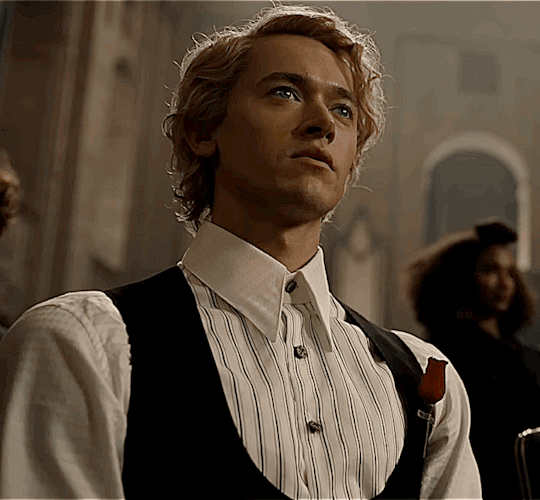
Sera Malfoy; pureblood, Slytherin, Orion Black ship. Everything you would expect a Malfoy to be - cold, cruel, and arrogant - but never to be made the heir to anything because she’s a woman, which she loathes. Plenty of people at Hogwarts desire her for her beauty, but she never deems anyone good enough for her. Has an on-and-off affair with Orion while he’s already betrothed to Walburga, which is super toxic and messy since Sera is mainly using him to try and get him to drop Walburga so she can be head of the Black household and Orion just wants to have the victory of sleeping with the girl everyone at Hogwarts wants. They actually wind up developing a sort of twisted connection, but break their affair off once Orion and Walburga officially get engaged. Eventually killed by Walburga after she finds out that Sera and Orion slept together one more time after they were already married and Sirius and Regulus were kids. After he moves back into his childhood home, Sirius finds a letter his father wrote to Sera but never sent, and a wrought-iron rose with a snake wrapped around the stem that she gifted him.
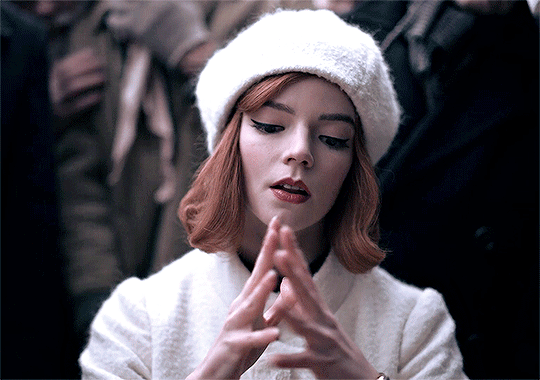
MARAUDERS ERA —
Orla Byrne; half-blood, Hufflepuff, Mary Macdonald ship. Daughter of a single mother who doesn’t find out her father was a wizard until she gets her Hogwarts letter, so she knows basically nothing about the wizarding world. Bonds with Mary over being Scottish witches trying to figure out this new world together, which eventually leads to them becoming cute girlfriends. Super sassy for a Hufflepuff and prone to using a lot of curse words. Also becomes besties with Mary’s band of other Gryffindor girls, but also becomes pretty tight with the Marauders, which annoys Lily before she starts returning James’s feelings.

Evelyn “Evie” Prewitt; pureblood, Ravenclaw, Narcissa Black ship. Middle child of that era’s Prewitts - Molly’s older sister and younger than the twins. Almost sorted into Slytherin and definitely showcases it - very ambitious and wants to be a politician. Meets Narcissa after they get paired together for a Charms project and start something of a more-than-friends thing, but they break it off after they graduate and Narcissa marries Lucius even though they genuinely love each other. Evie becomes a high-ranking politician in the Ministry of Magic eventually and never marries anyone else, and they wind up reconnecting and getting back together after Harry defeats Voldemort and Narcissa divorces Lucius when he goes to prison.
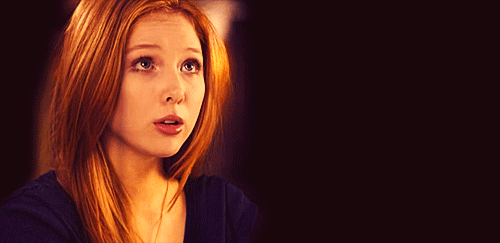
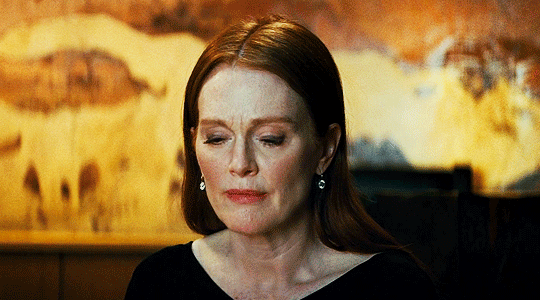
Nina Grey; half-blood, Hufflepuff, poly James + Lily ship. Daughter of a pureblood mother and Muggleborn wizard father, has been in ballet classes since she was really little, wanted to be a prima ballerina before she got her Hogwarts letter. Still regularly uses the Room of Requirement as a dance studio to practice her dancing, which is how she meets James when the Marauders run into the Room trying to get away from Filch after pulling a prank. Meets Lily after she sees James and Nina talking and approaches her to tell her to stay away from him, and they become friends, only for James to realize that he’s falling for Nina as well as Lily. Nina has already developed feelings for James and gains them for Lily as well the longer they’re friends, and Lily winds up realizing that she loves Nina about the same time she starts to return James’s feelings, so it’s kind of a whole mess, but they do all end up together in the end. Nina’s a total sweetheart who loves tea and reading and always wears ballet flats - basically she’s very soft-girl core and I love her.

Zachary Alonso; Muggleborn, Gryffindor, Remus ship. Son of Mexican-American Muggles/No-Majs who moved to the UK shortly after his tenth birthday, so he gets his Hogwarts letter instead of going to Ilvermorny. A bit of an outcast in his own dorm room for his first few years at Hogwarts since the Marauders are so close, but becomes friends with them in fourth year after he helps them pull off a prank. Becomes a lynx Animagus with the rest of the crew and gains the nickname Sharptooth. Only gets together with Remus towards the end of seventh year, but they’re a very sweet couple. Kind of a stereotypical Gryffindor - never backs down from a challenge, always wants to protect people, and would do very nearly anything for the people he cares about.

Clarissa Yeng; half-blood, Slytherin, Marlene McKinnon ship. Daughter of a wealthy wizarding family who are just outside of the Scared Twenty-Eight and who have sort of fallen from grace after her father married a Muggleborn witch. Determined to restore her family’s reputation, so she acts like a prime pureblood Slytherin, cold and ruthless and proud. Develops something of a rivalry with Marlene over outdoing each other in the Gryffindor-Slytherin shared classes that eventually turns to secret makeout sessions and, later, genuine romance. Naturally brutally honest and not very expressive, but also really touch-starved and craves genuine love and genuinely tries to be a better person once she and Marlene get together.
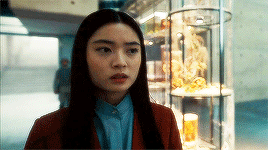
GOLDEN TRIO ERA —
Mariela Gomez; Muggleborn, (former) Thunderbird, poly Sirius + Remus ship. Transplant from America who becomes the new Muggle Studies professor in the Trio’s third year and winds up becoming very close to Remus. Winds up following him to the Shrieking Shack to help free Sirius and is kind of hurt upon seeing them interacting and realizing that they’re still in love because she was sort of developing feelings for Remus, but keeps in touch with him after he leaves Hogwarts and helps Sirius while he’s hiding out in his cave, and realizes she has feelings for both of them. Joins the Order once it gets back together and has a whole proper confession with her two boys right before the Battle of Hogwarts, and they officially get together after (because of course Sirius and Remus live, what do you take me for?). Incredibly caring and would do anything to protect her students, but also has no tolerance for people who are assholes to her or anyone else about being a Muggleborn - she winds up taking a lot of points off of Slytherin and makes an enemy of Snape because of it.

Lunella “Luna” Warbeck; pureblood, Ravenclaw, Marcus Flint ship. Daughter of the famous witch singer Celestina Warbeck, and is the exact opposite of her mother, very quiet and withdrawn. A very talented singer, however, and writes her own songs which are all really lovely. Meets Flint because she likes to sit in the Quidditch stands to write and winds up accidentally sitting in on a whole Slytherin team practice before anyone notices her. Gets accused of spying for Ravenclaw, which of course she isn’t, but Flint still invites her to the next practice as a way to show off and stick it to Ravenclaw, and then keeps inviting her and interacting with her until they eventually develop feelings. She winds up making him a better person and stopping him from joining the new Death Eaters after Hogwarts, and they actually get to have a happy ending together.

Hecate Lovegood; pureblood, Gryffindor, Fred ship. Luna’s older sister, but instead of getting bullied, goes mostly ignored by Hogwarts’s population. Autistic and only semi-verbal, so she rarely talks, and has a talent for creating enchanted jewelry. Makes friends with the twins after she lies to help get them out of trouble for a prank and abruptly becomes kind of a popular by osmosis, with a bunch of people wanting to buy her jewelry. Stays at Hogwarts after the twins drop out, but when they open Weasley’s Wizard Wheezes they offer her a whole section to sell her jewelry. She and Fred officially get together after the Battle of Hogwarts (because he lives, of course). Very much like Luna in terms of personality, but also a bit more snarky than her when someone’s being a bellend.

Zain Ahmad; half-blood, Hufflepuff, Oliver Wood ship. Hufflepuff Quidditch captain who has been Quidditch rivals with Oliver since they both started playing. Possibly the grumpiest and most sarcastic person to ever get into Hufflepuff, but still an amazing captain who’s loved by all of their players. Has the classic rivals-to-lovers thing with Oliver, but retires from Quidditch after they graduate and takes a job at the Misuse of Muggle Artifacts Office. Kind of an asshole with a heart of gold, doesn’t really show they care but always goes out of their way to do quietly nice things for people and would die for those they care about.
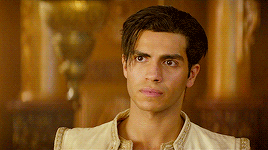
Nova Brackley; Muggleborn, Slytherin, Draco ship. A total outcast in Slytherin by virtue of being Muggleborn, but doesn’t really give a shit and can very often be seen flipping off their housemates. Incredibly talented at healing magic and sort of becomes Madam Pomfrey’s apprentice starting third year, and first meets Draco when they’re healing up his broken rib from a Quidditch game. The two of them bicker a lot because Draco feels like he has to be mean to them to keep up his reputation and Nova is not willing to take any of his shit, but they actually wind up falling in love eventually. They break up briefly after Nova can’t stop Draco from following his family into the Death Eaters (some of Draco’s angst in the sixth movie also comes from missing them), but they reconnect after the Battle of Hogwarts and eventually get back together, and Nova becomes a Healer at St. Mungo’s. Nova is basically Rosa Diaz incarnate, stone-faced and tough and not giving a shit what people think of them, but they’re also pretty funny and sweet once you actually get to know them, and they’re incredibly loyal.

Godric Marshe; pureblood, Gryffindor, Cedric ship. Named after Godric Gryffindor, of course, but very definitely doesn’t live up to his name because he basically has Neville’s relationship with magic, except his never gets better. Kind of an outcast and gets bullied a lot, and when Cedric approaches him after he’s been crushing on him for years, Godric definitely thinks it’s either a cruel joke or just the Hogwarts golden boy taking pity on him and trying to do the right thing. Rejects Cedric’s attempts at friendship for the longest time, but eventually they genuinely become friends and boyfriends later. Very quiet and insecure due to his lack of magic, but an amazing writer who slowly comes out of his shell thanks to Cedric and eventually becomes a novelist.
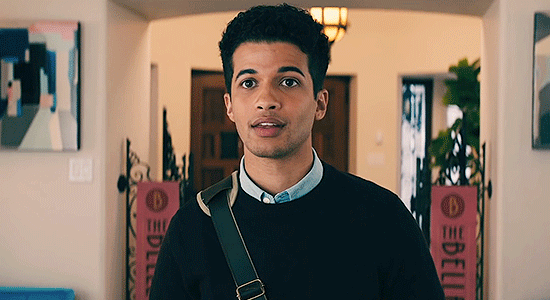
Allegra Pennyworthy; pureblood, Slytherin, Neville ship. Daughter of the Sacred Twenty-Eight but supports Muggleborns and doesn’t give a shit about doing what her family wants, and is something of an outcast from Slytherin because of it. Offers to help Neville in Potions since it’s her best subject, and falls him love with him through that. Eventually becomes Hogwarts’s new Potions professor when Neville takes over Herbology. A total badass, fierce and protective and cunning and never afraid to speak her mind; Neville both adores her her and fears her a little bit, and he’s basically the only person she lets herself be soft around.

Penelope Barker; Muggleborn, Gryffindor, Cho ship. A she/they partner for Cho because she deserved better. Technically Muggleborn, but was adopted by a wizard couple when she was a baby so they’ve always been familiar with the wizarding world. Much more focused on playing Quidditch than on academics, but is still best friends with Hermione and generally relies on her tutoring to pass her classes. Falls in love with Cho pretty much the very first time they see her on the Quidditch pitch, and spends years pining over her until they get to talking at the Yule Ball (Cho went by herself instead of with Cedric), and follows her into Dumbledore’s Army the next year until eventually they kiss after a meeting. Becomes a professional Quidditch player after Hogwarts, on the same team Ginny leads. Incredibly sweet but also super awkward and clumsy off of the Quidditch pitch, regularly tripping over her tongue and her own feet. Becomes a godparent to Hermione and Ron’s kids.

Aaaaand that’s all, folks! Holy shit, this is a lot (😅). As I said, not all of these babies are gonna get official intro posts or anything like that, but you’re always free to ask me whatever you want about any of them!! <3
#randomness#plot bunnies#harry potter ocs#wizarding world ocs#oc: charlie fairweather#oc: amelia jameson#oc: sylvie miller#oc: ptolemus lovegood#oc: sera malfoy#oc: orla byrne#oc: evie prewitt#oc: nina grey#oc: zachary alonso#oc: clarissa yeng#oc: mariela gomez#oc: luna warbeck#oc: hecate lovegood#oc: zain ahmad#oc: nova brackley#oc: godric marshe#oc: allegra pennyworthy#oc: penelope barker
19 notes
·
View notes
Text
Harry Potter-like series reveals a sexfluid character among its protagonists
Do YOU: A) Support trans/LGBTQ rights, BUT ALSO B) Want to be 100% free of any guilt while you enjoy/embrace a story that contains all of the following:
Up-and-coming young wizards/witches attend a magical academy together
Said academy is a castle in England
The students attend the academy for seven years
Classes include magical combat, potions, magical creatures, herbology, and broom-flying
While the students attend those classes, they simultaneously have adventures in and around the school's grounds, encountering dangerous beasts and dark wizards?
If that sounds like something YOU want, I legit recommend you try out Reign of the Seven Spellblades — a light-novel series which became a manga which has now become an anime!
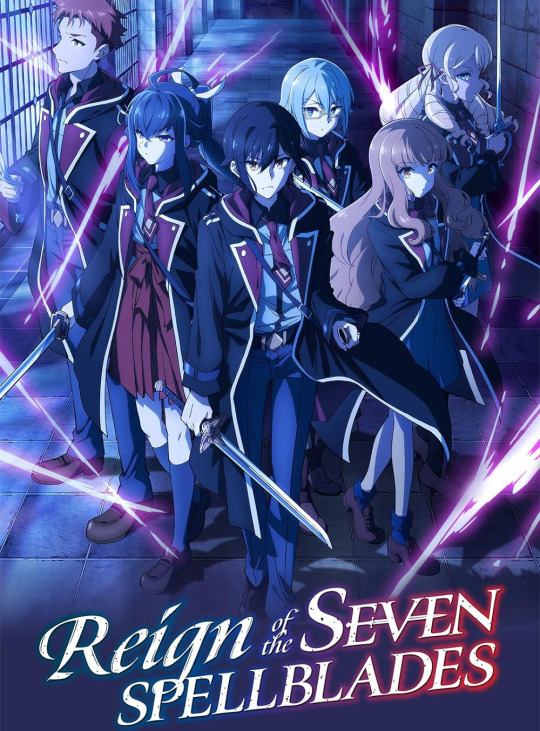
I first came into this series via the current anime. And as the headline up above states, said anime recently revealed one of heroes in the focal circle of friends has literal sexfluidity. (Like, they're not merely genderfluid. They actually switch their physical sex. ["If only it were that easy," amirite?])
Episode 7 (i.e., the one right after that big twist/reveal I wrote about previously) begins with one of our protagonists, Pete Reston, waking up from a strange dream to reveal that the character-formerly-known-as-"he" is hiding breasts under their shirt. Upon my first viewing, I naturally thought we were learning that Pete was secretly transmasc this whole time, which would've been a cool enough touch. But I've already spoiled that that's NOT where this story goes, so...
Ultimately, Oliver (Pete's roommate and the series' co-lead) notices that Pete's... shaped differently, and Pete is forced to admit that they don't even know what's happening to them. Lucky for Pete, then, that Oliver has read up a LOT on the magical world. He's always there to drop a knowledge bomb. Like this one.
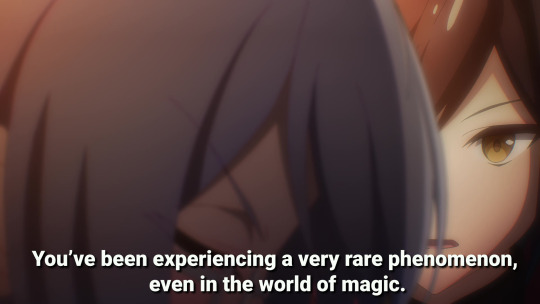
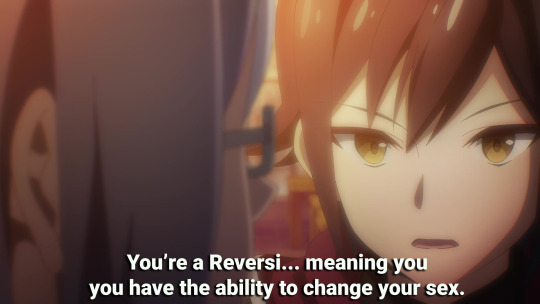

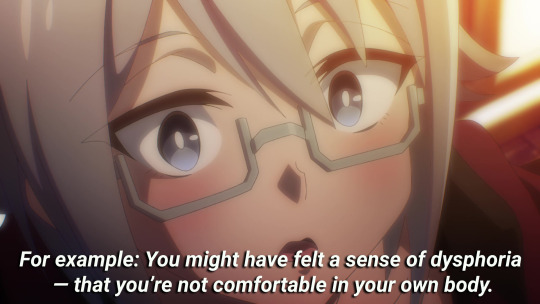
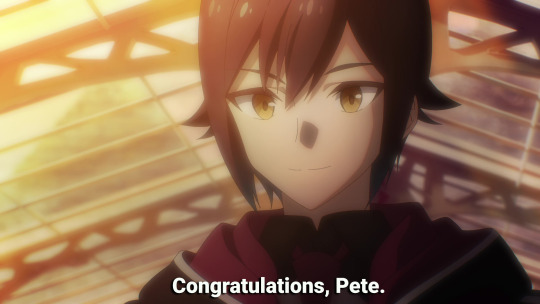
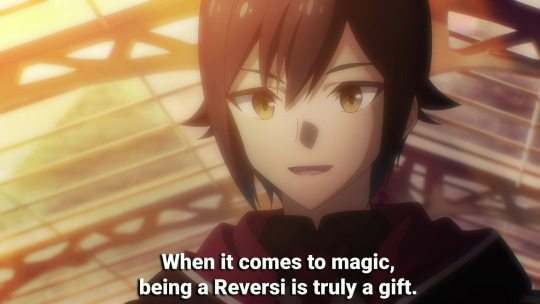
Not only does Pete then get the full support of his friends (who finally learn all about this in episode 9 and are happy for him/have no problem with it), his class president also steps in to share with him a secret meeting place for people just like himself.
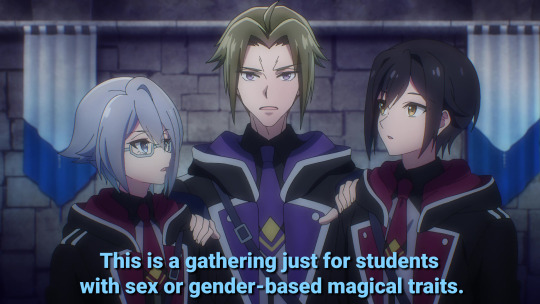
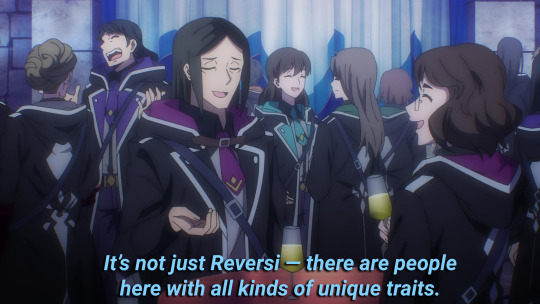
QUEER MAGIC CLUB QUEER MAGIC CLUB
So yeah; it's been a pretty cool little touch. Plus it feels like they're gently flipping the bird at the creator of Rot7S' obvious inspiration.
#trans rights#anti-j.k. rowling#anti-jkr#anti-jk rowling#reign of the seven spellblades#oliver horn#pete reston#anime screencaps#anime#harry potter-like#queer magic club#queer#magic#sorcery#idk#non-binary#genitalfluid
41 notes
·
View notes
Text
The Magic of Potterverse Games
As a child who grew up watching the Harry Potter films. There's always this interest in wanting to be a part of the Potterverse. Something about the whimsical world that entrances us all to one day, join the hallowed halls and leave a mark on the universe and on Hogwarts itself.
So, with that said. Let's explore a more immersive side to the franchise that allows one to coexist in the universe with familiar faces to guide us as we navigate the world of Muggles and Wizardkind.
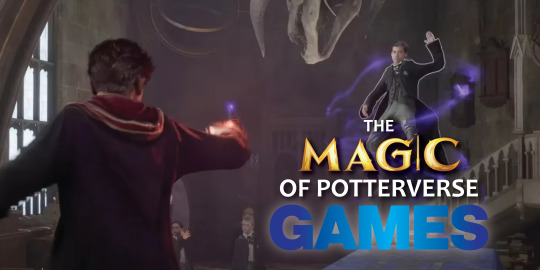
- There Once Was a Boy -
Destined to be a Star ~
Back when the movies came out, game developers tackled the interesting concept of doing magic like Harry Potter through the Harry Potter film-based games.
To make it short, see [Flatlife's - Evolution of Harry Potter Games] The games were made in a variety of ways. You play as Harry Potter, traversing around the grounds of Hogwarts. Solving puzzles, going to classes, and combat various foes.

Despite the fact that the graphics are simple and often seen as horrendous. The games as a whole, were considered a success. It laid the foundation for the desire to learn the skills of a wizard/witch and explore the school grounds. Applying the lessons in combat and winning the day as Harry Potter. But that left the question;
What if, instead of playing as Harry Potter. We play as our own self-insert character?

The good news is, becoming a Hogwarts student seems a lot more accessible with the mobile game <Harry Potter: Magic Awakened>
Of course, this isn't the first attempt in the Potterverse's history of self-insert games. In 2018, another mobile game <Harry Potter: Hogwarts Mystery> was released to the public as well as the highly anticipated console game <Hogwarts Legacy> released in 2023.
I think it's worth mentioning, regardless of your opinion towards JKR's views. The lasting effect of this franchise has raised a generation of fans and their love for magic.
- Welcome to the Dueling Room! -
As a film-only based fan of the franchise, I find that; NetEase, Avalanche, and Jam City managed to capture the wonders of using magic and being in Hogwarts. Due to the nature of the universe's magic system, the games used several ways to tackle the issue of using magic.
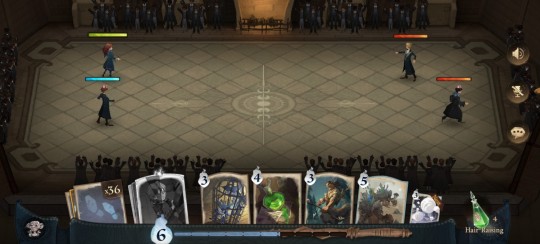
In Magic Awakened, the game uses a mana-point system that limits spell casting. The game also uses a Card Game base in which players can mix and match card types and upgrade for significant effects.
The cards come in a variety of references. From summons of popular magical creatures, famous props, and the spells themselves.
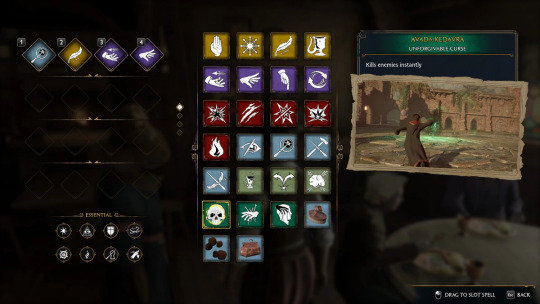
In Hogwarts Legacy, your spells are limited to what I like to call, a Hotkey Shortcut. By limiting the slots to four different abilities. Players can combine a limited set of spells in combat to deal with the more fast-paced nature of the game.
The game emphasizes the importance of using potions for that quick boost and custom clothes as additional cover. Because the game has a special condition/ finishers called "Ancient Magic" the player is encouraged to travel around and find unique upgrades to improve and build resilience. It's simple, quick, and also the most fun game to use magic.

In Hogwarts Mystery, the combat style is a lot slower and has a two-punch effect. The first part of the duel is decided by Aggressive, Defensive, and Sneaky moves. Similar to the Rock, Paper, and Scissors game. Which when won, allows the first strike.
After that, the player is given a list of spells with various effects. The spells can sometimes cause massive damage and sometimes even stun/skip opponents for one turn. Because Hogwarts Mystery is a decision-making game, it's often regarded as the weakest attempt at magic.
- Do you Like My Scarf? -
Magic spells aside, The game's respective story is awfully predictable and bland. From the little that I personally played and hear from the folks of the community. The three games did the safe thing by doing the <Fantastic Beasts> route.
They distance themselves to different eras of the Wizarding world's history. By the game's own description, Hogwarts Legacy is set decades before Harry Potter and Fantastic Beasts. Following a special witch/wizard who enrolled at Hogwarts as a fifth year.
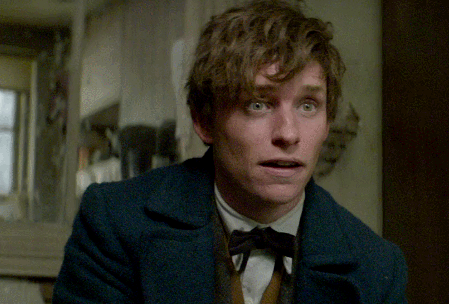
Hogwarts Mystery is set roughly a generation before Harry Potter. Making them seniors who just graduated when Harry just entered. Meanwhile, Magic Awakened is set after Harry Potter. Close to around the time when Harry, Ron, and Hermione's kids started their year at Hogwarts.
Each year deals with its own type danger. From a dark magic rebellion to a cursed student of a deranged sibling to whatever Magic Awakened was trying to do. (I'm a bit slow to that game)

My issue with these games is, there seems to be this tendency to make the MC a center piece to the story. While it is, after all surrounding the MC's life. I couldn't help but feel that as far as developments go. Nothing is interesting about the MC's canonical story.
The games are also wasted with issues of telling via dialogue but not showing via action. The drama of the story didn't feel as impactful. While the player's decisions can sometimes change the outcome. It is far from being as big of an influence as I thought it would.

As far as playing the game itself goes, I only played Hogwarts Mystery till year 4 and stopped out of boredom.
I am enjoying Magic Awakened so far since it doesn't make the MC take center stage but rather uses the side characters to put weight to the story and to the playable cards. Granted, I'm not as active.
That said, I am still looking at a lot of its interesting parts from an outside perspective. So I would very much like to hear a rebuttal.
- Return to Hogwarts, Join My Dorm! -
Back when I was still playing the game, I came across a few users who interact on social media as their own MCs. They would use screenshots of their characters and write a treasure trove's worth of lore and developments. Discuss their favorite crushes and build more lore upon their OCs.
Seeing the encouragement and love between users and their OCs, got me to start uprooting my HPHM character; Sadie mac Lir and interact with quite a few names in this community outside of the games.
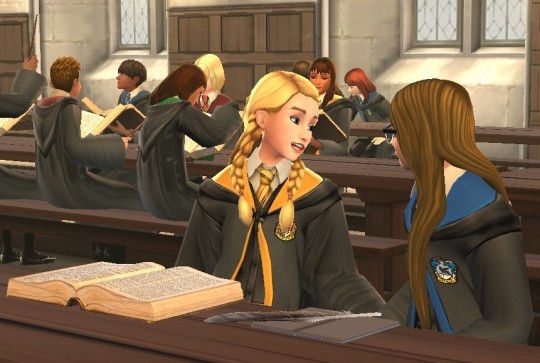
But after realizing that the story is just not as rich as I'd imagine, Sadie transferred into the world of <Murder The Crow> following Hector Dagger, the story's original character, and was later added with Jamie Robyn who is now a placeholder in Magic Awakened.
In spite of the situation with JKR and some of the whispers of this fandom's dark side. The fandom is still going strong as ever. While I have distanced myself, I still linger with the friends I made along the way. Most come from an artistic perspective with their OCs and art in general. Some of them are just good conversationalists.
It felt like being in school again. To learn from one another, socialize among fellow housemates and discuss plans for the future and have fun little interactions. Being in cliques and enjoying the other bit of magic that is not in the games, friendship.

In conclusion, I think it's been a wonderful journey for Harry Potter's gaming side of the fandom. The games went from being Harry to becoming your own Harry. To forge your own path in a world that is rich with possibilities and build friendships in-game and out of the game that might last lifetimes.
For a fandom as big and equally as problematic as Harry Potter. The Potterverse games have proven that it truly is not our abilities that show who we truly are. But rather, it's our choices that make the significant change.

Thanks for Reading
- Caw4B -
#harry potter#harry potter hogwarts mystery#harry potter magic awakened#hogwarts legacy#hogwarts school of witchcraft and wizardry#harry potter universe#portkey games#wizards unite#wizarding world#hogwarts oc#ravenclaw#slytherin#hufflepuff#gryffindor#sadie mac lir#jamie ann robyn#jamie robyn#penny haywood#rowan khanna#ivy warrington#newt scamander#severus snape
47 notes
·
View notes
Text
Read this instead of Harry Potter - part 3/ 3:
Young Adult (YA) recommendations under the cut:
Part 1 - Adult books
Part 2 - Middle grade/children's books
Arrows of the Queen (Heralds of Valdemar trilogy) by Mercedes Lackey (high fantasy): There's actually multiple series in the same world. In this trilogy we follow Talia, a young girl who lives in a small community that misteats her. She doesnt know any different, this is the only life and people shes ever known, but then is chosen whisked away by a mystical horse and taken to a school to become a trainee Herald, destined to become one of the Queen's own elite guard. For Talia has certain talents of the mind only her horse companion can sense. Here, as she works to master her abilities, she also begins to learn to trust for the first time in her life, connect with other people, and understanding her trauma. Meanwhile, conspiracy and trason is brewing in the realm, and only the Heralds can help protect it from its enemies.... This first book is very heartwarming and classic fantasy. In the sequels we follow her as she gets older and the sacrifices and darker, heavier moments that come with that. Honestly thos one sounds like the same brief for the main character as HP. Lackey has great LGBTQ+ representation too.
★ Sorcery of Thorns by Margaret Rogerson (novel + novella): About a warrior-librarian who finds herself entangled in an evil plot in a world where magic books, called grimoires, have sentience and can turn into monsters if they're not properly taken care of. These grimoires are created by magicians whose magic comes from demons linked to their old-blood families, and these magicians' houses are full of magical artefacts, strange curses, hidden rooms magically folded up between walls and sentient gardens, all very reminiscent of Hogwarts' ever-shifting magical corridors.
★ Lockwood & Co. by Jonathan Stroud (series, British): Teenage ghost-hunters, magic bureaucracy, dark vibes, historical artefacts, death discussions, found family, haunted houses, suspense, and more.
The Nature of Witches by Rachel Griffin (standalone): In this world, witches maintain the climate, but when this control starts faltering, a witch with rare magic, connected to every season is the only hope.
To Kill a Kingdom by Alexandra Christo (duology): Mermaids! For Goblet of Fire fans.
Raybearer by Jordan Ifuenko (duology): Tarisai was raised in isolation by a mysterious, absent mother until one day she sends her to the capital, to be chosen as one of the crown prince's council and kill him. This is a story about friendship and the love and warmth of family.
Cemetery Boys by Aiden Thomas: Yadriel has summoned a ghost, and now he can't get rid of him. This story is about a Latino, trans young wizard, who battles with his family accepting his gender.
★ Legenborn by Tracy Deonn (trilogy): Arthurian retelling with a black protagonist who enters a secret society in her university to solve the mystery of her mother's death but she finds it more full of magic and secrets than she expected. Secrets that might even tie to her own heritage and bloodline...
The Diviners by Libba Bray (quartet, paranormal, mystery, horror): It's set in 1929 New York, the protagonist, Evie, comes to the city to live with her uncle, who has an unhealthy obsession with the occult and she worries he will discover her greatest secret: a supernatural power that has only brought problems so far. When a girl is murdered and branded with a cryptic symbol, she realizes her power might help solve the murder. Great alternative to Fantastic Beasts and Where to Find Them.
Scythe by Neal Shusterman (trilogy, sci-fi dystopian): This has themes about death and mortality/immortality. Set in a world where humanity has conquered hunger, disease, war and misery, now a group of select people called scythes are tasked with ending life to keep the population size under control. We follow two apprentices to such a vital profession, a role that neither wants.
This Savage Song by V.E. Schwab (duology): In a city overrun by monsters created out of acts of violence, there's no such thing as "safe", a young woman and a young man on opposite sides of the divided city, must decide if they will become enemies or friends, heroes or villains and what means to be one. (I mean if that premise is not the analogue to a Horocrux or werewolves idk what is.) I also recommend City of Ghosts by this author (set in Edinburgh, where the protagonist's parents host a TV show about haunted places. But the protagonist can enter this world of spirits ever since she almost--or did drown.)
The Little Witch by M. Rickert (short story): Every Halloween an elderly woman hands out candy to a young trick-or-treater girl who's always dressed as a witch and looks the same age every year. She grows more and more curious and attached to her and her oddness.
One Dark Window by Rachel Gilling (duology): To stay safe in her eerie, mist-locked kingdom, Elspeth needs a monster. One day she meets a mysterious highwayman on the forest road, and her life takes a drastic turn, thrusting her into a world of shadow and deception. Together with the highwayman, they must gather a set of magical cards that are keys to cure the kingdom from the dark magic infecting it. But Elspeth is forced to face a dark magic taking over her own mind. This sounds great for people who liked the horrocruxes as a magic device, who like exploring evilness corrupting a character from the inside out, and for fans of the dark forest in Hogwarts.
Stalking Jack the Ripper by Kerri Maniscalco (series): Set in London in the 1880s, we follow Audrey Rose Wadsworth, born a lord's daughter, who yearns for more than social tea parties and dress fittings. She has a secret life working in her uncle's laboratory, studying the gruesome and fascinating practice of forensic medicine. Then a string of savagely killed corpses begin appearing... Deliciously creepy horror novel inspired by the Ripper murders.
School for Good and Evil by Soman Chainani and illustrator Iacopo Bruno (series): This year, best friends Sophie and Agatha are about to discover where all the lost children go: the fabled School for Good & Evil, where ordinary boys and girls are trained to be fairy tale heroes and villains. As the most beautiful girl in Gavaldon, Sophie has dreamed of pink dresses, glass slippers, and devotion to good deeds all her life, she knows she’ll earn top marks at the School for Good and graduate a storybook princess. Meanwhile Agatha, with her shapeless black frocks, wicked pet cat, and dislike of nearly everyone, seems a natural fit for the School for Evil. But when the two girls are swept into schools, they find their fortunes reversed... Is this really a mistake? Or is it a clue to discovering who they really are?
Into the Labirynth by Jown Bierce (series): Hugh is the worst student the Academy of Skyhold has ever seen. He can barely cast any spells without them failing explosively. He is an outcast in the school, and he definitely doesn't expect a mage to choose him as an apprentice, but when a very unusual mage does, his life starts taking a sharp turn for the better. Though, he still has to get ready for his final test in the labyrinth below the school.
Fireborn by Rosaria Munda (trilogy): post-revolution/overthrowing the government plot, with dragon riders and maybe a child of the old regime survived... This is perfect if you were unsatisfied by the infamous HP7 epilogue.
Eva Evergreen, Semi-Magical Witch by Julie Abe (duology + prequel): Eva Evergreen is determined to earn the rank of Novice Witch before her thirteenth birthday. If she doesn't, she'll lose her magic forever. For most young witches and wizards, it's a simple enough test, but Eva has only a pinch of magic and always gets the spells backwards. But she comes up with a plan: set up a semi-magical repair shop to help her town and prove she's worthy. But the biggest magical storm in history threatens the town. Will her little bit of magic be enough? If you wanted justice for the squibs in HP!
The Magician's Guild by Trudi Canavan (trilogy, adventure, epic fantasy): Every year, the magicians gather to purge the city of undesirables. Cloaked in the protection of their sorcery, they move with no fear, until one angry girl hurls a stone at them; there is someone outside their ranks who possesses raw magical power. She must be found and schooled before she destroys herself and her city with the power she can't control.
Elatsoe by Darcie Little Badger and illustrated by Rovina Cai (standalone, mystery, magical realism, LGBTQ+): Set in an alternate USA with magic, monsters and legends. Elatsoe, an indigenous girl, can raise the ghosts of dead animals, a skill passed by generations of her Lipan Apache family. Her beloved cousin has just been murdered and she will protect her family and unveil the secrets of this town.
★Vampire Academy by Richelle Mead (YA, series): A magic school but for vampires instead of witches. Still has magic in it, with the dark vibe that goes with vampires. It's a trashy teen vampire series in the best way, tbh. Great to pass the time.
Graphic novel recommendations:
Witch Hat Atelier by Kamome Shirahama
Anya's Ghost by Vera Brosgol
⚠️The following books are often recommended too, but some or their authors are problematic, so tread with caution: ⚠️
The Raven Boys by Maggie Stiefvater: Has racist Asian stereotyping/jokes in the third book of the series. The author has some problematic behavior on Twitter but I don't know the details.
Eleanor & Park by Rainbow Rowell: Asian racist stereotypes of the character Park. Carry On/Fangirl could be options, I suppose.
Scholomance series by Naomi Novik: The first book, A Deathly Education, had damaging racist passages and stereotypes of black people's hair. The book was later reprinted to fix the issue.
Ender's Game by Orson Scott Card: This author is staunchly homophobic.
Skyward & Mistborn by Brandon Sanderson: This author is a Mormon. By this religion's rules, they have to donate a percentage (aka tithing) of their net earnings to the church (around 10%), and the Mormon Church actively funds anti-LGBTQ+ initiatives. Sanderson has been asked before about this, but he hasn't given a clear answer on his contributions. He is presumably paying the tithes, though he will tell you he is pro-gays if you ask him. His books also have heavy religious preaching and his world-building is often very cis/hetero-normative. He is doing great work fighting against Amazon's book monopoly though, using his popularity and power for good, which is great. (I have read his books before but nowadays I would rather read other authors and I will never BUY any of his books.)
Happy reading!
★ Books I've read and personally recommend.
Supporting Sources:
https://www.aspiraldance.com/middle-grade-and-young-adult-books-to-read-instead-of-harry-potter/
https://missprint.wordpress.com/2022/09/01/back-to-magic-school-harry-potter-alternatives-booklist/
Goodreads for synopses.
#anti harry potter#I'm tempted to make a list for movies & tv shows too#but I think I read more than I watch tv haha#harry potter#nostalgia#anti jkr#anti jk rowling#joanne karen rowling#please grow up harry potter isnt even that good#jk rowling#fantasy#books#book recommendation#book recs#alternatives to harry potter#save this for later#book recommendations
8 notes
·
View notes